#he Showed you how this implied tragedy was affecting our main character
Text
ok so i love and adore moon knight but i can’t stop thinking about it in the context of the other disney+ marvel shows and this article about the trauma plot, specifically these lines:
“Trauma has become synonymous with backstory, but the tyranny of backstory is itself a relatively recent phenomenon—one that, like any successful convention, has a way of skirting our notice. Personality was not always rendered as the pencil-rubbing of personal history…Nicholas Dames writes in “Amnesiac Selves” (2001), describing a tradition of “pleasurable forgetting,” in which characters import only those details from the past which can serve them (and, implicitly, the narrative) in the present.
Certainly the filmmakers of classical Hollywood cinema were quite able to bring characters to life without portentous flashbacks to formative torments. In contrast, characters are now created in order to be dispatched into the past, to truffle for trauma.”
And when you look at Marvel’s other body of television work, it’s basically this formula, over and over. Moon Knight is a more artful iteration of the cliche, but it is hardly unique. episode 5 itself is essentially a case study of the trauma plot, in an absurdly literal sense: two characters going room-to-room and exploring memories like they’re walking through an ikea display.
from an audience perspective, the cathartic hit can be deeply compelling, especially when combined with an incredible acting performance (like Oscar Isaac’s). but at what point is this good/necessary storytelling, and at what point does it become pseudo-emotional indulgence?
#lmao in the article they even name-drop wanda maximoff#so clearly it's not unseen#moon knight#ely.txt#tl;dr marvel is hopping on the trauma/mental health train because its trendy#and i think there is very little genuine exploration behind it#im just thinking about how matt reeves adamantly refused to use any flashbacks in the Batman#not just because people already knew the origin story backwards and forwards#but because he was more interested in showing the man in the present#living with his trauma#and how that affected his actions in a moment-to-moment way#he Showed you how this implied tragedy was affecting our main character#instead of walking you through it piece-by-piece#idk man im just thinking !! im just having thoughts
12 notes
·
View notes
Text
Official statement on why Izzy's death affected me so much
Our Flag Means Death, is, at it’s core, is a show that focuses on queer joy- a form of therapy for those that have been raised on queerbaiting, shipping minor side characters, or watching, when nothing else is available, queer tragedies. You know how it goes- the two main characters, both male, have chemistry. They say things to each other that seem weirdly like declarations of love. They look at each other with love in their eyes. You see these things and the main man gets married off to a badly written, unfinished female character and is left feeling empty. The best friend dies for the main character to live. When everyone talks about how cute the main couple are, you want to scream all of a sudden, because nobody can see this love story play out except you. It’s queer, it’s tragic, and nobody else can understand it.
Not Our Flag Means Death. From the moment it aired, it was praised as a show with unabashed queer joy, which means more than I can possibly say. The two main male characters meet, they have chemistry, and they fall in love. It’s not implied, or hinted at, but blatantly obvious. Their romances and the queer romances around them attracted so many queer fans who felt that after so many years, this type of show was a vindication for what they had been through with other media.
In this show, piracy itself was that of a found family. Though Stede Bonnet and the crew of the Revenge start off with many differences, the core of the show centers around a theme that many queer audiences are attracted to: found family. The Revenge was depicted as a safe space, where everyone could express themselves freely, a refuge from a world of judgment. Queerness was not only accepted but normalized on The Revenge. No homophobia, no coming out, no typical complications of queer romance. Just love and safety. Warmth, which was Ed Teach wished for in purgatory. Which was what he found on the Revenge. The ship was a safe space that so many queer audiences had dreamed of.
Well, a safe space except for one person: Izzy Hands, Blackbeard’s First Mate, who was a man painfully stuck in the wrong genre. This is the general consensus by both fans and the cast: Izzy, Edward and their crew had been in a gritty action movie, whereas Stede and his crew were in a muppet movie of sorts. While the majority of Blackbeard’s crew quickly acclimates to and celebrates the change, Izzy doesn’t.
And right away, many fans felt a deep attraction to Izzy. The reason that Izzy couldn’t get Edward to love him was because, in the end, the only way that Izzy knew how to love was through blood. To give and receive pain in an action movie is one of the greatest forms of love, but Izzy fails to realize that Ed is not in an action movie anymore. He is happy with this stability, and the reason that so many people felt Izzy’s presence so was strongly was that he wasn’t.
So many queer people are, in a way, addicted to tragedy. Tragedy is all that is represented in queer media for the most part, or was until very recently. Take Achilles and Patroclus, one of the most celebrated and recognized queer love stories of both ancient and modern times. Why that one? There are other greek love stories, many of them queer. The tragedy of it- Patroclus’ death and Achilles’ rage- made it all the more appealing. Many in the audience of Our Flag Means Death were not comedy fans, they were horror or drama fans, attracted to a comedy because of the love story. But Izzy, to them, was a physical representation of who they were, carrying an awareness of homophobia, of blood and pain that so many queer relationships had previously been illustrated by (i.e. Hannibal). Though Ed may not have understand this type of affection, the audience did- Izzy’s Otherness from the crew despite it’s safety, his expressions of love and his unrequited love story were all things that the audience were familiar with feeling.
If Ed and Stede were good queer representation, Ed and Izzy, for example, were a foil of that. They were evil, messed up, and fed into the worst parts of each other because it brought them closer. This is a theme present in a lot of queer media, and by extension, queer lives: “if you love me, Henry, you don’t love me in a way I understand”, is an excerpt classic queer poem about unrequited love that fits the situation. The very reason Izzy stuck in people’s heads because he was of a different genre. His grittiness and bitterness made sense to the audience. They saw Izzy and saw what was familiar. He was exquisitely written, simultaneously making even casual audiences both hate him, and against all odds, find him oddly endearing. The idea of this man sacrificing every inch of himself for an unrequited love was a concept of tragedy, leaking into a comedic show.
So fans projected onto Izzy. He was a catalyst for the heartache, for the audience’s sheer inability to have a happy show. For one reason or another, some of the audience simply couldn’t live with a show that was all fantastical, which I theorize is because they couldn’t see themselves in it. So Izzy became the epitome of queer suffering: pining longingly after another man that couldn’t understand him. This projection of suffering, however, led to a new wish: happiness for Izzy. If Izzy in Season 1 was a tragedy, assimilating him into the found family in Season 2 would have elevated the safe sense of the ship all the more. It would have proved to so many of these Izzy Fans that yes, even though you view yourself as unloveable, even though you see yourself as Israel Hands, Villain, even he can be loved too. Why can’t you be?
And Season 2, for the most part, delivered beyond our wildest dreams. Izzy had people who cared about him. And though the genre shifted into the darker, Izzy himself shifted slightly to the comedic side as well. His life, which had been centered for so long around a man that didn’t reciprocate his feelings, was gone. He started a new life, and this life, again, focused on queer joy. The queer joy from Season 1 was suddenly for everyone, even those like Izzy that couldn’t have understood it. He sang, he whittled, he talked about feelings, he dressed in drag. Many elder queer fans also saw Izzy as another metaphor, too: that queer joy can be attained overtime. You don’t have to have had it the whole time, but you can accept yourself even when you are older. The message of Izzy was one of resilience and stubbornness, one that the queer community needed to hear: that you don’t have to be like this, you don’t have to create pain for yourself. You don’t need to watch tragedies all the time. You, too, can heal from the past.
And then, the season finale happened. By this point, many argued that Izzy had stolen the show. Con O’Neil’s acting mixed with his general arc of self acceptance had made him a fan favorite. In the last episode, it is Izzy himself who sums it up perfectly, accepting that he belongs somewhere despite his pain and flaws. Despite the darkness within him, he was still accepted and loved. He says it right to the face of Prince Ricky, who thinks himself above it all. That piracy, a metaphor for otherness, wasn’t actually about being alone; it was about finding others that understood you when nobody else could.
Listen, this show is known for it’s nonsensicality. In the finale of Season 1, Lucius is thrown overboard by Ed and survives by simply swimming to another ship. Stede reunites with his crew by sailing a rowboat. Buttons turns into a seagull. Stede stabs Ed for a comedic bit. Earlier in the season, Izzy himself gets shot and survives. This queer joy show was celebrated for being, well, joyful. Even when things like getting thrown overboard did happen, they were, ultimately, a blip in the character’s journey towards acceptance, healing, etc, which was what made the show unique. Our Flag Means Death, whose audience had been living for years off of the “Bury your gays” trope, was adored because it illustrated a world where things didn’t have to be that way. A place where the impossible, such as Izzy Hands being loved, could happen. This show was one of survival.
But not for the one person that was seen to struggle with this concept the most. Not for the one person that was a metaphor for belonging in this place, who became, over the course of a season, the embodiment of the message itself. Not for the Unicorn, the very symbol of this magical, nonsensical ship. Not for the most stubborn, most indestructible, most enduring (queer) person in the show. Not for Izzy Hands.
This trope, honestly, was one that many have seen before, both in mainstream and queer media. A character, previously shown to be a villain or else to have gone through a lot of pain, is shown to heal, to get better, and then to die in order to “complete their arc”. This trope is common: Loki, Cas. even Ted Lasso, who doesn’t die but goes back to the very place that broke him in the first place. But the reason that Izzy’s death, while it might have been expected in another show, felt like a betrayal in this one is because it was known for subverting those tropes. From the “Bury Your Gays” to the “Up For Interpretation”, it was known to look those tropes in the eyes and say “fuck you, these people deserve to be happy”. And this did happen! Except for the one character who’s healing journey was one of the most relatable, at least to queer audiences.
What also made it so jarring was that all the other characters got to be happy, except for the one that had struggled with the idea of happiness the most. In the scene immediately after Izzy is buried, Lucius and Pete get married. In the scene after, a montage of queer joy and found family is shown amongst the whole crew. In the final scene, Ed and Stede, our main queer couple, are shown healing themselves and starting a new life together. The last shot, however, showed Izzy’s grave, visited by Buttons the seagull while Ed and Stede had dinner. A tragedy in it’s finest. It wouldn’t have been difficult for Izzy to live. Because, in the end, his death meant nothing. His healing meant nothing. He died and was moved on from in a matter of seconds. He was, as I mentioned, the catalyst for tragedy, more specifically, queer tragedy. But because of this, of his genre, Izzy didn’t get to live. He had to die in order for the rest of the characters to keep living in this fantasy world. This death was, in a way, a preservation of these other love stories.
I maintain, however, that it would have meant more if Izzy had lived. If he had been able to show to us that yes, despite what you have been through, despite what you may have inflicted upon yourself, you can switch genres. It’s possible. Izzy’s survival up until that point had been a profound testament to many that it is possible to heal, that queerness does not have to mean sadness. It would have continued to be a testament to that if only Izzy had lived. And so, this pirate that we latched onto, not in spite of his darkness but because of it, was buried on land on the side of the road.
As a side note, many previous incidences in the story point to the idea even though Ed and Stede will definitely stay together, it’s uncertain if the inn would have worked out. It’s likely that, being a whim, those two might have chosen to move, or go back to the sea, or sail to China. If this is true, they would have left Izzy’s grave by itself, like a family pet buried in the yard. If this is true, Izzy Hands, a metaphor for belonging, would rot alone.
Long live the tragedy addicts. Long live the Richard Siken poems. Long live Izzy Hands.
*When I talk about the "fandom" I am referring to the canyon.
#izzy hands#izzy hands apologist#izzy canyon#our flag means death#ofmd finale#ofmd#izzy hands death#izzy deserved better#ofmd fanfic#i guess#ofmd canyon#con o'neill#tragedy#oh uh happy new year#ofmd meta
269 notes
·
View notes
Text
I’m about to go into another very long Marvel rant/dissertation here— mostly for myself— that I started writing soon after the Loki Series finale so please feel free to just scroll past this, because honestly I think I kinda overdid this one. It’s jaded and overly dramatic even for me. You have been warned:
The last 4 Marvel movies/shows I’ve watched left me feeling so completely depressed and unsatisfied and hopeless about the future of popular entertainment and story telling in general, and I know I’m not the only one. The fact that fans are going into these experiences hoping for a good story and character arcs that make sense with prior characterization, and leaving feeling… empty is a very clear sign that their approach leaves a lot to be desired.
Infinite War had some valid reasons to end the way it did, because by having our heroes fall so much harder than ever before, it built up the tension and high stakes for the next film. But what does that do when Endgame leaves us feeling even worse? I wanted them to triumph and finally come together to be better. I expected there would be losses of course but not enough to negate the wins. Instead the characters were subjugated for plot, characterization was watered down, and we lost all the original Avengers besides Thor and Bruce (who was no longer even Bruce). Peter loses Tony, Thor’s previous loses are permanent, and so many other things that, in spite of loving a lot of the movie, mean I haven’t been able to stop being sad about it for literal years. And the amount of thoughtless destruction that seems to be at an all time high when it comes to character’s lives and disregard for properly exploring emotions just doesn’t leave much to be expected at this point. Far From Home was good. It was. I liked it a lot. The acting was wonderful and there were some really interesting themes they grappled with but I still walked out of the theater feeling like there was still so much detachment surrounding a lot of the decisions, a little too much thoughtlessness (that, and the gaping hole of Tony). I’m not going to talk about WandaVistion but I’ll say that I was invested until the start of episode 8, and finished episode 9 feeling drained and tired and sad.
Then we get to Loki, a show which has plagued far too many of my thoughts since I started watching it, and has crushed my hopes for ever truly being happy with a Marvel project ever again. Loki is a character who’s ostensibly felt alienated and unseen for most of his life, and that’s before finding out about his parentage. His first movie ends with his suicide attempt and subsequent fall into the void. His second takes place a year into working under Thanos and ends with him being taken away in chains (yes I know he’s the villain he’s done bad things etc. etc. but for the purposes of this I’m only focusing on his pov). Then his third involves his solitary imprisonment, his mother’s death, and his near-death (considering the likelihood that he was actually stabbed), although it does end on a lighter note with his acquisition of the throne. Then we get his redemption and reconciliation with Thor in Ragnarok, immediately followed by the utter tragedy that is the first 10 minutes of Infinite War, which I don’t think I need to explain.
So what I suppose I’m saying here (very very inadequately) is that after all of that, I can’t believe the proper story to tell in his first chance at being a main protagonist was one where he’s constantly degraded and beat up, convicted of things he didn’t actually do, given no focus on backstory or implied/established motivations, and labeled as a clown and a narcissist! His powers are weakened, he displays almost no recognizable mannerisms or competence, he’s held to a higher moral standard than every other character, shown no respect, and ultimately loses EVEN MORE. We’ve seen him lose and lose and lose and lose again. We’ve seen him die THREE TIMES, we’ve seen him redeemed TWICE. So who in their right mind thinks that the most compelling story to tell after all of that was to see him LOSE AGAIN?! And not only lose, but lose without any real triumph, dignity, or acknowledgment beforehand. Death to the author aside, reading the utter nonsense the team behind it have spread, it’s so clear that it wasn’t made in good faith. Whether in ignorance or true maliciousness, they just don’t care. They didn’t research. They didn’t try and see things from his point of view. They didn’t truly sympathize with him as a person while writing. They didn’t understand. And they truly, truly wanted him to fail.
I’m tired of feeling hopeless at the end of everything, of leaving the theater or turning off the TV wondering why I even bothered, why I even care when I’m just being strung along with as little consideration as an audience as my favorite characters. I wanted to actively see him strive to be better, not just be told he could be. I wanted to see him triumph over his demons, not forget them. I wanted to see him be the “master of magic” that every other damn movie has alluded to, and to use his powers effectively. I wanted him to be powerful. I wanted him to, if not win, then win on a personal level at least. I wanted to see him take agency in his life and PROVE EVERYONE WRONG! And, though it’s now bafflingly controversial to say, I wanted it to be told by an experienced and competent writing and directing team that knew and understood his character and were passionate about telling his story.
I would ascribe to the notion of “don’t like it, don’t watch” if I could but I care to much to not be affected by this obvious decline in quality and awareness. And I’m a relatively recent fan. I haven’t been waiting for Loki to get his moment in the sun for 10 years. I’M NEW HERE, and my heart breaks so much for fans of the original movies who have lost their love of Marvel or Loki because of the way it’s been handled. No one should fall further than they can climb up from, and I’m tired of watching loss after loss and never getting the release of gaining enough of it back. What’s the point of caring about these characters if the writers won’t? Of investing in a connecting cinematic universe if it lacks continuity? Of looking for clues and foreshadowing when there isn’t any and the only twists are random and pander to shock value? The way these pieces/characters are being created and interpreted is reductive and incompetent, and for once I’d like to watch something that feels crafted, inspiring, and gratifying to see to the end.
If some people like the Loki show we got, I have no argument against that, because my own opinion is just as subjective as theirs. Though, I’d like to think that if what I want is for the show to be better out of love for the same character, then what they enjoyed from the show can coexist in that. If anyone’s actually read up to this point, I have to admit I’ve forgotten mine. Mostly I just wanted to express my frustrations over how unfeeling and stale most entertainment, specifically from Marvel as of late, has been.
TL;DR: I care too much, waaay too much, Marvel cares too little, Disney doesn’t care at all, and I don’t know how to accept that.
#jazzy’s thinking too much again#marvel thoughts#marvel critical#loki series critical#loki series negativity#marvel#loki series thoughts#Loki series#why am i like this??#loki
178 notes
·
View notes
Note
Since the first thing that strikes me about re8, story-wise, is that it seems to be all over the place? Again, I’ve no idea how it ties to previous games but it feels like this parental/mother-child theme is just hanging there with no resolution at all? I mean yes, Ethan saved his daughter, presumably breaking some sort of abuse cycle, yay, congrats, but what about his wife/gf? Isn’t she supposed to be like the main protagonist of the story of a mother bereaved to the point of tyrannical madness
Or rather, this specific story is not the right choice for his character since there’s SO many ethical and philosophical issues and questions implied but never properly explored because of Ethan’s ‘fuck you, idc’ attitude (which is completely understandable in those circumstances but adds virtually nothing to the plot and arguably even ruins it a bit).
Heisenberg could’ve been an excellent ally with fascinating grey morality (provided the writers wouldn’t push him to the point of absolute insanity and let freedom, not power-hunger be his main goal and motivation for rebellion).And again, aren’t the lords supposed to represent child development stages? In which case Ethan what? Kills the possibility of some evil version of Rose? Or his own chance to experience fatherhood throughout all of those stages?
Either way, it seems a bit… weird to have a Parent destroy multiple people whose main relevance to the plot is that they’re children of an abusive antagonist in a storyline so extremely focused on parent/kid relationships.
I feel like the main theme of re8 is not just parenthood/motherhood, but the relationship itself of the parent to the child. There's a lot of mentions to "children being used". Miranda kidnapping people, experimenting on them and mutating them and then treating them like they're her kids; Miranda kidnapping and practically killing Rose; Dimitrescu making daughters out of reanimated corpses she experimented on; Heisenberg wanting to use Rose's powers, etc etc.
And it's important that Miranda is at the center of this. There's something very interesting she says to Ethan in her boss fight:
"Why do you interfere? Surely you have no need of Rose now, so close to death?"
And that's where her mistake was. Ethan wasn't doing all that because he needed Rose herself. He was doing it to save her, fully aware that he wasn't going to be a part of her life cause he knew he was dying. Miranda was way too dependent on her love for Eva - and like, I honestly get it that losing your child can devastate you (if anything my fear of that is one of the reasons I don't want to have kids) - so much that her life literally revolved around her child. Once Eva died, Miranda wanted to die. Once she found the Megamycete and discovered she maybe had a chance to bring Eva back, she dedicated her entire life and ruined multiple others to do just that. Her one and biggest need was to get Eva back. It wasn't a simple want or wish. It was a need. She'd get her child back, damn everyone else - including other people's children.
Miranda had no-one to blame directly; Eva had died from the influenza, it wasn't like she had any chance to change things. Ethan's case was different; he had people to blame, particularly, the one who kidnapped Rose and dismembered her, and her lackeys who kept said parts and fought him for trying to take them back.
So on one end, you have a parent who lost her child due to a tragedy, and ended up destroying other - innocent - lives in order to get her back. On the other, you have a parent who lost his child due to a crime, and ended up going after the criminals responsible in order to get the child back. Like, it wasn't even revenge, and it wasn't that he "needed" Rose in his life. He simply wanted to save her and ensure she'll be alright.
I fully agree it could have been Mia as the protagonist in re8, and that it was a wasted opportunity to simply fridge her and have her in the sidelines angsting over her husband. But whether it was Mia or Ethan as the protagonist, I feel like the theme that I explained above does offer a resolution, showing the opposites of Miranda and Ethan, and ending Miranda's tyrrany of her "need" to have her child back through Ethan's determination to ensure his child's safety and happiness - even if he doesn't get to be a part of any of that later on. Miranda showed obsession; Ethan showed dedication.
And this is how I see the abuse cycle breaking and the resolution is reached; an obsessed parent hurt a good parent's child to bring their own child back - the good parent's dedication stopped the former, allowing the former's tyrrany to end and their child to grow up safe.
Seeing as this is a horror game, I don't tend to focus on the morality issues (if I'm interpreting your second message correctly). Like, the developers are making a grant effort to put us in Ethan's shoes, first-person POV, plain character protagonist and all; our child got kidnapped and practically murdered, and we have the chance to bring her back. We'll absolutely raise hell to the people who are responsible for it and we will get our child back, fuck any moral dilemmas we might have. When someone is threatening your life, you have the ability to kill them to defend yourself. In the case of a caring parent, that ability may multiply by a lot when the threat is towards their child. And I feel that this is what the game explored in the end. Though the whole survival issue is taxing on Ethan, he doesn't give a damn about who he has to kill if it means saving his daughter - but again, it's only the responsible parties. We see how watching all the people at Luisa's house die affected him, and even before Elena died, he wanted to ensure her safety before he went searching for Rose; he is sympathetic and morally rational, but also capable of cold-blooded murder if someone is threatening his child. To a lesser extent, we saw that in re7 too. With his life on the line, he killed Jack (multiple times) and Marguerite, and at the end he recognized how they were actually victims of Eveline. But they were still actively trying to murder him so he wasn't given the chance to help them. With Zoe, he promised to send help, and he did, even wanting to talk to her once she'd been rescued by her uncle and Chris. The same applies to re8, but as I said, it's multiplied since it's his daughter who's in danger, and the end of re8 proves he cares for her safety more than his own.
Now, all that said, I think it's important to note how it's stil a Resident Evil game. I haven't actually played or watched any playthroughs of other games, but the basic concept in these games, from what I understand, is that the player shoots zombies; ex-human beings who have lost any human mentality and will just come for your throat if you don't kill them first. They're not humans anymore, they can't be reasoned or sympathized with. It's not really an issue of morality, ethics or philosophy. Your life, and the life of your child in the case of re8, are in danger. You don't give a shit. You just start shooting and hope for the best. Again, I don't know if the morality issue is explored in other RE games, but to be honest... Resident Evil doesn't sound like the kind of franchise that's thematically into going super deep into the morality of shooting zombies to save your life.
I have to admit I haven't thought of the Lords being representative of child development stages. I think they could be put as Moreau being a toddler, fully dependent on their parent - funnily enough, the Greek word for baby is "moro", pronounced almost exactly the way "Moreau" is pronounced in the game - Donna as a child, Heisenberg as a (rebellious?) teenager, and Dimitrescu as a late teen/young adult (if anything, Dimitrescu seems to behave like the eldest child of the bunch). But I'm not sure the connection that has to Ethan as a father, if anything because the bosses are fought in complete random order of age, if my analysis is correct. Like, I understand the symbolism behind the Lords' behaviours, maybe as you said they represent the obstacles Ethan had to overcome. In one single day and with his life on the line, instead of in the course of Rose's entire childhood and adolescence, but that's exactly why he hated being a protagonist of a horror game, lol.
Anyway, yeah. All in all, I don't think Resident Evil is a franchise where we should expect to sit down afterwards and ponder whether we were right to shoot the zombies that were trying to kill us. Again, I'm not the right person to ask this, since I don't know anything about other RE games, but that's the conclusion I'm making in a meta-thinking way.
#Resident Evil#Resident Evil Village#Resident Evil 8#Ethan Winters#Mother Miranda#re meta#anonymous#ask and ye shall receive
18 notes
·
View notes
Text
Guardian rewatch: Episode 3
First of all, wow. When I decided to post those online, I was expecting that they would be read by two people, both of whom I personally know. It was in equal part surprising and terrifying that so many of you ventured here. Thank you for reading, I really appreciate it.
Episode 3 is probably my favourite case. It’s not perfectly strung together, there is little actual investigative work in it, but it’s a beautiful story of boundless love and devotion, which echoes through the relationship between our protagonists
Professor Shen is looking at some materials that are looking suspiciously like research into something supernatural, when Zhang Ruonan makes an appearance at his office, claiming that she is absolutely fine, while clearly being very far away from fine. This is something Shen Wei can certainly relate to, because he is the king of hiding his ailments from others.
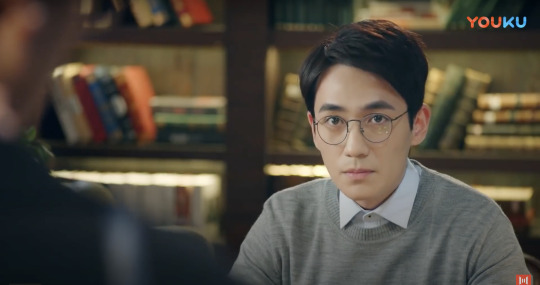
Zhu Hong’s one-sided affection for Zhao Yunlan starts to show already in this episode: while he has the cold, she nags him to take care of himself, shoves tissues into his hands, and presses him to drink his meds. It’s easy to imagine even this early on that she will be the woman drunk dialling him one day.
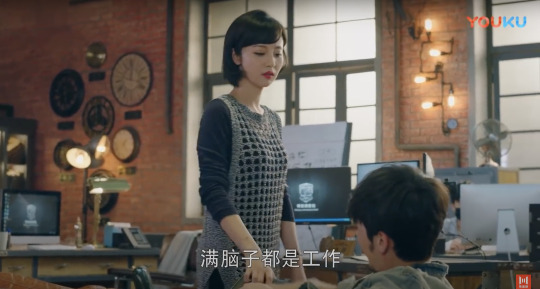
I know this could be seen as straightbaiting, but I honestly thing that the actual purpose it serves in the show is the opposite; I’ll talk more about it when we get there.

Zhao Yunlan spends a lot of this episode in Shen Wei’s office, starting with this scene, in which is obviously flexing. Not only does he sneeze all over the office, he goes to eat Shen Wei’s cake after specifically being told not to eat it. He also takes his opportunity to mix questioning with flirting, as is his usual way. He keeps eye contact while spooning cake into his mouth, as he explains, jovially, that another mysterious death on his campus cannot possibly be a coincidence. And, to be fair, he is not really wrong. We are meant to believe that this is all set in motion by Zhu Jiu, aka the least scary villain in the history of villainy, and an owner of your staple baby goth wig. I will not mention him again until the plot makes it impossible for me not to do so.
Zhang Ruonan comes in, and Zhao Yunlan introduces himself as Shen Wei’s good friend. Which is half-way between a flex and an act of kindness. On one hand, he could have said he was from the police - which would be absolutely true - and risk tarnishing the professor’s good name. On the other hand, he could probably look less pleased with himself. Shen Wei, at the very least, looks neither grateful, nor amused.
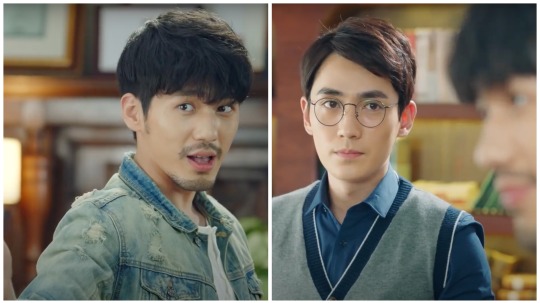
Zhao Yunlan asks her if she new the victim and she looks incredibly shifty as she flees. He is right to think that something is up, and he correctly assumes trauma, rather than guilt. We can now start to see that he is very very good at reading people. It must be equal parts thrilling and disconcerting for him to have met something who he decisively cannot read. Shen Wei vouches for the woman, partly, surely, because his Hei Pao Shi sense is tingling, letting him know that someone is eavesdropping.

Despite feeling uneasy, Shen Wei still offers Guo Changcheng, who is left to collect various paperwork from his desk, a little smile. He has a reason to like Xiao Guo, of course: he was the one to see the young man’s kindness and understanding, and he is already growing protective of him, way before he will start seeing members of the special unit as his people. This reminds me of how many months later, he will subtly, but decisively stop a barrage of verbal abuse against Xiao Guo by dropping a pair of chopsticks.
Zhao Yunlan is taking Xiao Guo with him on the case rather than anyone else, partly, supposedly, because of Guo Changcheng’s familial connections. The young man looks more sure of himself, asking correct questions, dutifully records answers. He also tries to look after his Chief by asking him to go home and rest. He does phrase it badly, but Zhao Yunlan has a thing against his own health and well-being, so he reacts extra poorly.
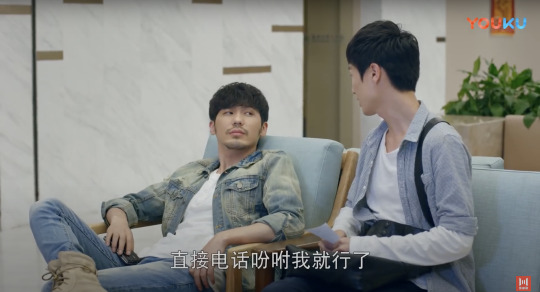
Soon after, Zhao Yunlan’s at Shen Wei’s office yet again, as Shen Wei tries his best to ignore him, in the hope that he… well, maybe not goes away, but does not ask him anything that will require him lying. Instead, Zhao Yunlan is asking Shen Wei why he is bad at reading people, which is a very strange thing to ask. Shen Wei answers his question with a question, “Will seeing through people really lessen the hurt and disappointment?” Adding, “Many tragedies were destined from the beginning”. He looks well.. like this as he says it.

This is loaded. On first glance, it’s a pretty good set-up to the way this story will unfold, as a tragedy of two individuals who let their devotion to each other nearly ruin each other’s life. A fragile human and a dangerous powered Undergroundian: what else is that, but a tragedy, waiting to happen? But this story - this one right in front of us - will not end tragically, at least not for the two people it enters around. It could do so, but it will not. Maybe, this truly is the first hint that this entire narrative, so carefully set up from the very first time Zhao Yunlan and Shen Wei meet, is destined to be a tragedy. Moreover, that it must be one, for some cosmic reason.
(… I apologise while I go have a little cry in the corner. Damn you, Guardian, why do you make me hurt so much?)
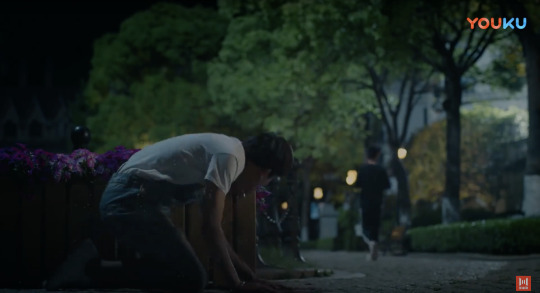
Da Qing inexplicably morphs from black cat to a human in white t-shirt while doing night shadowing, and promptly falls asleep on patrol. Why is he being sent to stake anyone out? He is least suitable for it. He is literally a cat. He sleeps 16 hours a day.

Surprisingly, when pressed, Zhang Ruonan comes clean very easily, revealing that she was a victim of the three students she failed (two of which are already dead and one one standing right next to them), who lured her out at night, which left her vulnerable to be attacked. Zhao Yunlan listens to this story, and instead of… oh I don’t know, perhaps asking her the identity of the third student, leaves to go find that out for himself. It is heavily implied that he does it on purpose, which is definitely not okay.
Moreover, he goes and... asks Shen Wei. This makes me suspect that he’s not really thinking with his head at this point. As he does so, he is brandishing a letter opener.
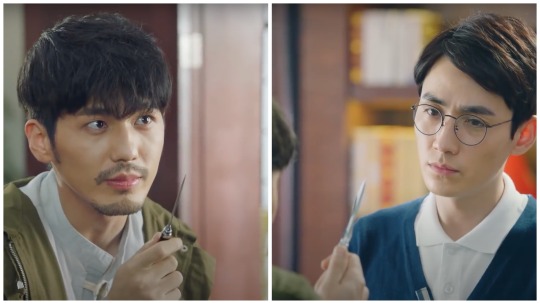
Shen Wei is looking even less impressed with him than he did during their last few conversations.
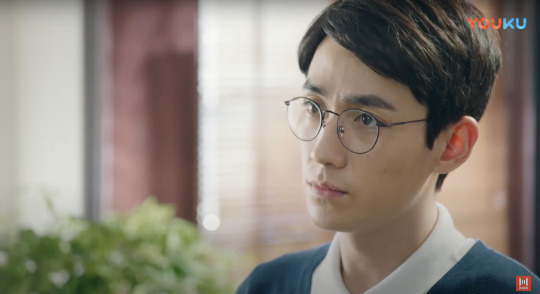
Zhao Yunlan is a little bit flippant when it comes to students’ lives this episode. And yes, they have done something really quite horrible to another human being, but that's not a very good excuse to let the last of them just die. As it happens, the situation Yunlan created - perhaps on purpose - did lure out Zhao Ruonan’s murder girlfriend, but it also cost a student his life. Which is far from ideal, but is somehow never even mentioned. Instead of being aghast, he sits on the table as he goes into full interrogation mode. (As he will continue to do a lot. Sometimes he crouches on tables instead. There is no further point here, apart from: I like this character quirk. It’s a nice character quirk.)
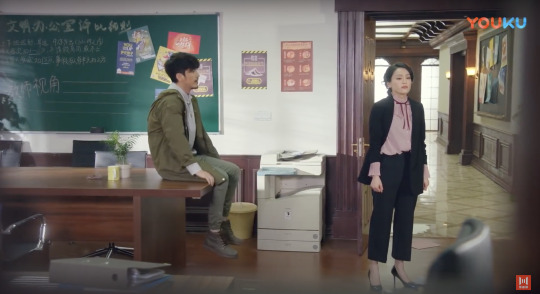
He brings some of his team in at this point, and asks Zhu Hong to continue interrogation. It would be a nice gesture is he did not interject two questions in.
“How do you regard your relationship with Wang Yike?”
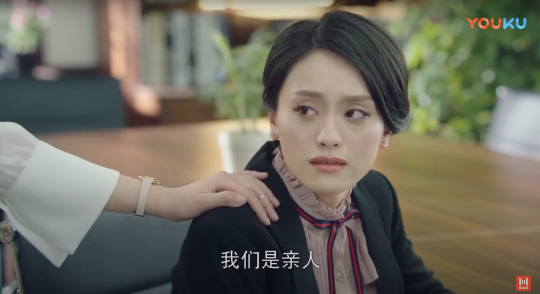
“We are family.”
They are definitely, decisively not going for sisterly bond here. Which is kind of incredible. This is one of the moments the amorphous being that show is looks at the censors, wiggles its battered low budget eyebrows at them, and then proceeds to flip them off. Well done, Guardian.
Wang Yike calls Zhang Ruonan, saying there is one more victim she needs to take care of, and Lin Jing traces the call back to campus. Zhao Yunlan, who did not even bat an eyelid at a dead student earlier, now looks decisively worried
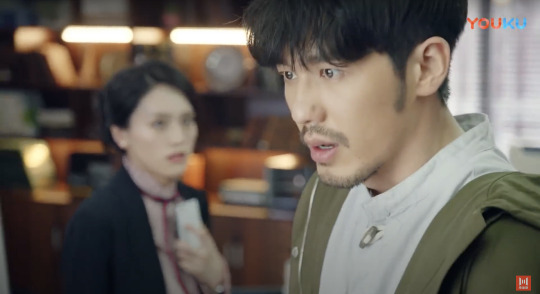
“Oh no. Professor Shen.”
The only reason Shen Wei is attacked is jealousy. Wang Yike does not know this of course, but trying to kill him is a bad move, because a) he has long ago given his heart away, and is definitely not interested; b) this is probably the only thing she could do to make the man on the case very very upset; c) Shen Wei’s immune to her powers.
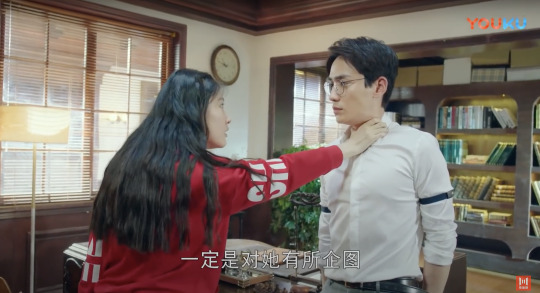
“Someone like you will never understand what she means to me!” Wang Yike shouts eventually. “As long as I can protect her, my life has worth!” And, even as Wang Yike has no way of knowing it, these are the words that ultimately save both her and her loved one. Because Shen Wei does in fact understand what Zhang Ruonan means to her. His own endless and ultimately self-destructive devotion is his main driving force.

Shen Wei pretends to be hurt, again, which earns him a half-hug from the object of his devotion. If Zhao Yunlan does notice that Shen Wei should really come out of this attack grey haired and dead, and not just mildly inconvenienced, he chooses not to say anything.
Worried about her murder girlfriend, Zhang Ruonan rushes in and accidentally touches her. Zhao Yunlan Freaks The Hell Out. Shen Wei does, too, but in his own, reserved, way. They are both emotionally invested in those two people, although for very different reasons: Shen Wei is acutely feeling resonance of his own past in their story, and Zhao Yunlan, I think, wants to fix it, he wants to be able to make it better. Instead, Shen Wei fixes it for him, turning the tide on this tragedy, and giving it a happy ending. He heals Zhang Ruonan right in front of the officers of SID, albeit with much subtlety. (“Have someone saved her right under our noses?” Zhu Hong will snort the very same evening, and she will be 100% correct.)

Shen Wei also lets Wang Yike go despite the undeniable fact that she did kill three people. Here, he is looking at the picture of this human/Undergroundian couple, surviving despite all odds, and touches his only reminder that Kunlun really was in his life.
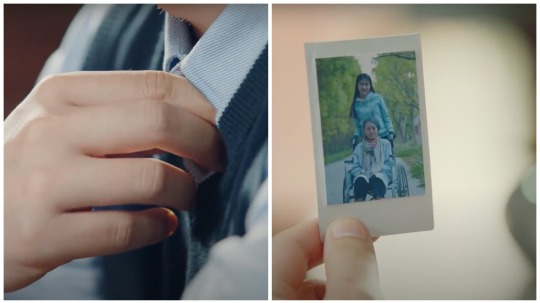
He then burns the picture as the only evidence that Wang Yike was not punished by him for her crimes.

In the end, Guo Chengcheng is making first of his many diary notes about the events, recounting a conversation between Shen Wei and Zhao Yunlan we had not witnessed, in which Shen Wei mentioned a relationship based on devotion that can last a thousand years, and Zhao Yunlan called such a relationship “guarding”. Finally, Guo Changcheng hopes that he can become a guardian of all.
And this is making me think that this absolutely should be a set-up for him becoming a wick of the guardian lantern, as per every single other decision that was made prior to the last two episodes. Right? This is a perfect foreshadowing, and mentioning it here, so early in the show would not make any sense if it were a deliberate subversion. So, was Guo Changcheng meant to become the wick after all before... what, some rewrites happened? What made the final episode be what it was in the end?
(This is a genuine question by that way, if anyone has any insight on the matter.)
The episode would end here, if this was a western show, with a familiar monster of the week structure, but it does not. At least, the way it ends is reminiscent of a cliffhanger, with Zhao Yunlan catching Shen Wei in a middle of a crime scene, and looking betrayed.
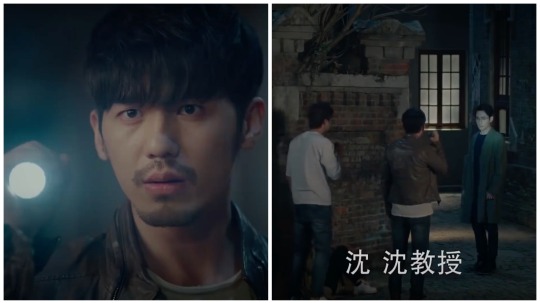
Next episode: Lynchian Nightmare, aka people without faces.
PS.
I did not have a seamless way to stick this in anywhere but... Shen Wei’s technological ineptness at the max: he does not know how to use a Polaroid camera. Help him, he is so lost.
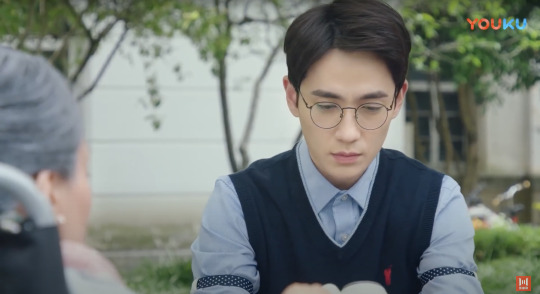
——
Second point of housekeeping to say a few things:
I don’t think I will be consistent with certain things being transliterated versus translated. I am more likely to use Hei Pao Shi rather than Black Cloak Envoy (because the later reminds me of Tuxedo Mask, which makes me inwardly giggle every time) but at the same time I am also more likely to use Underground/Undergroundian rather than Dixing/Dixingren. I am more likely to use Xiao rather than Little, but have called Chu Old rather than Lao before. I hope that’s not grating, but do tell me if it is
My recaps are Shen Wei-heavy. I have no real explanation for this, apart from.. I like Shen Wei.
I realise that there will definitely be things here that are head canon and speculation rather than flat observations; this show is a work of fiction and a work of art, which cannot be interpreted objectively. If you have alternate takes on anything I write in the future, let me know!
45 notes
·
View notes
Text
Winter 2020 Anime Overview: Toilet-Bound Hanako-kun
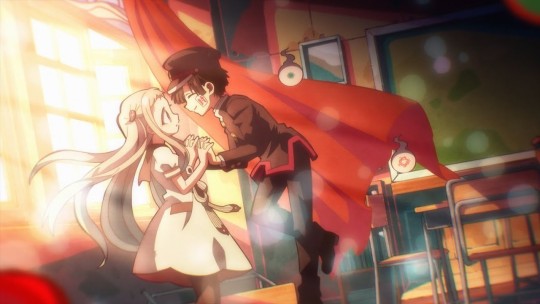
Ok, so let’s get this out of the way first, 1. I adore this story so much and 2. Toilet Bound Hanako-kun has a horrible, horrible English title that is not actually at all representative of the story’s content and I have no idea what happened when it came to the team choosing that name. To the average English-speaking viewer/reader, this name 100% implies gross stuff and bathroom humor, and there is none in this show.
A Japanese reader on the other hand, would be more likely to recognize the name Jibaku Shounen Hanako-kun as a spin on the classic ghost story “Hanako-san of the Toilet” only A BOY THIS TIME WHHHHA?” Basically, the story goes that a girl named Hanako in a red skirt haunts girls’ bathrooms in Japanese schools and if you knock on the third stall and call “Hanako-san” three times, she’ll appear. She might grant you a wish or pull you into Hell or something else, it varies.

(Her Wikipedia image, aww.)
Anyway, I dunno why the English title didn’t at least go with “Toilet Ghost Hanako-kun” or something that would have gotten the premise across even a little better (HE NOT TECHNICALLY BOUND BY THE TOILET EVEN, HE CAN GO ANYWHERE IN THE SCHOOL GROUNDS THE BATHROOM IS JUST HIS HOME BASE), but our boy Hanako haunting the girl’s bathroom only leads to broad jokes about our heroine being tasked with cleaning the bathroom and “dude you really shouldn’t be in here” comments, it’s pretty incidental.
Now that THAT’S out of the way, let’s talk about my LOVE FOR THIS STORY
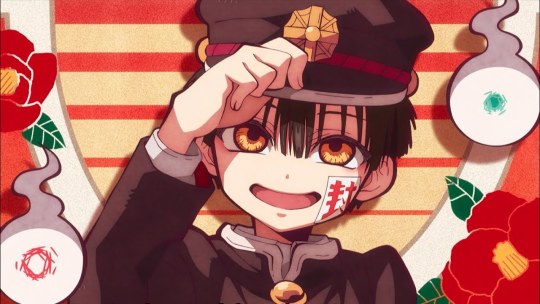
Hanako-kun tells the story of a “regular” high school girl named Nene Yashiro, the mischievous and mysterious school ghost she befriends, and all the other weird monsters, exorcists, spirits and curses they encounter. It’s got a gorgeous, colorful bold aesthetic and art style that combines gothic and cute! It has a great mix of humor, intrigue, angst and fantasy action. basically if you love ghosts, monsters, Japanese mythology and legends, supernatural-human relationships, supernaturally fueled angst and drama, stories about trying to fix an unfair system the world has set up, wistful romance, a good shoujo manga with a Lot of Feelings (yes this is a shonen technically I’ll explain that later), weirdo dorks becoming friends AND MUCH MORE...this story will have something that will resonate with you. It’s got a lot going on, and it’s a ton of fun.
Hanako-kun is really one of those surprising stories that fits right into a hole in my story-loving heart I didn’t realize was still there, or that I’d actually been carrying since childhood. I love ghosts, see, and have since I was a kid!!! I knew this, but I kinda forgot how intensely I love them until this show reminded me again??? That’s because regular ghost stories/mysteries/whatever- I like them, but they don’t quite do it for me in the way more character-driven ones exploring the nature of being a ghost and humans and ghosts trying understand each other etc do. Stuff that really gets into the tragedy AND the fun fantasy aspect of ghosts, and plays the long game with it- and Hanako-kun scratches that itch perfectly.
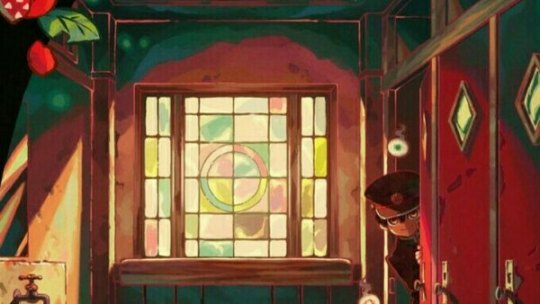
Getting a little bit deeper into the premise of Hanako-kun, Nene is a very brave and sweet but not-all-that-bright girl (or, to put it more bluntly, she’s an idiot in the best way) who has a lot of romantic fantasies and insecurities and is VERY focused on them. After hearing a rumor at school that “Hanako-san of the bathroom” will grant wishes, she wishes to be able to confess to her crush and finds out its actually a weird ghost boy her age named Hanako haunting the bathroom! A lot of things happen, and she ends up cursed and bound to Hanako-kun, but also ends up slowly forming a friendship.
Turns out Hanako is the ghost in charge of the “seven mysteries/wonders” aka seven powerful supernatural entities that haunt this school (he’s number seven). These apparitions only supposed to terrorize students a LITTLE, because apparitions need to have rumors spread about them to remain in the human world.
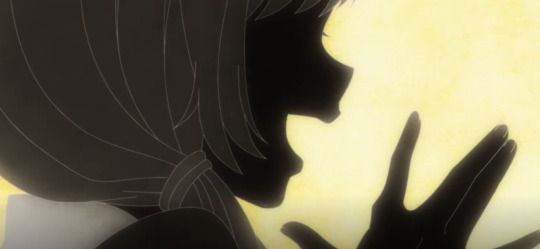
(‘HAVE YOU HEARD?’ Oh hey shadow girls from Utena see you’ve moved to a new school.)
The rumors also generally dictate how powerful and dangerous the apparitions actually are- but SOMETHING MYSTERIOUS is changing the rumors around the school and making the apparitions go berserk and actually harm humans. So Hanako needs a human assistant to change the rumors and help him calm and seal the apparitions! That’s where Nene comes in.
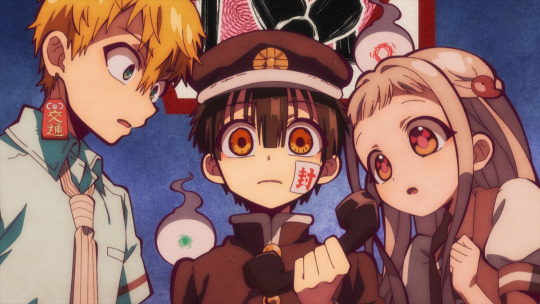
Hanako himself is a very fun character- he’s very chaotic and revels in his whole “ gremlin ghost” persona, and is upfront about being a bit of an asshole. BUT he also makes his kindness, often good intentions and the fact he’ll have his friends back when it counts obvious from the beginning. B U T! He’s also got darkness and hidden depths to explore, and a lot of his persona is affected and masks deeper issues!
Our ghost boy is genuinely A TAD unstable deep down (as in he straight up has several untreated PTSD symptoms and that’s as disastrous as you’d expect) and packing some serious tragic backstory, as you might expect from a kid who died young and carries around a butcher’s knife, and it’s gonna come back to bite him and and all who care about him hard.
Especially when an overly enthusiastic exorcist named Kou Minamoto shows up! Kou is another one who’s very dumb and very good, a wannabe-shonen-protag with a heart of gold and strong sensitive, domestic side. He rounds out our main trio. Also he gets a tragic, emotionally intense relationship with yet another ghost boy that sings to my heart.
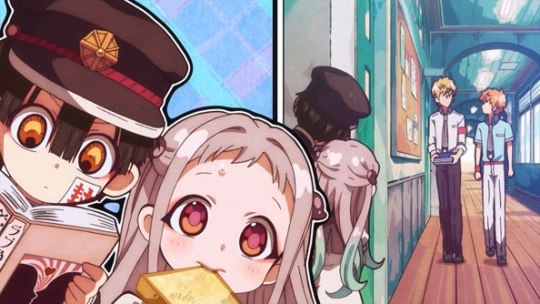
(Yes Hanako’s helping Nene to do the thing)
You may be able to tell, this story has INTENSE good-shoujo vibes despite technically being a shonen in a way that I love- it’s story very driven by big emotions, a variety of fucked up and tragically complex relationships, teen hormones running wild, etc, and it’s just delicious.
Nene is the normal-person-audience-surrogate-girl in a way that is more common for a shoujo protag, and the way her emotional connections to everyone, her sweeping romantic fantasies and her interiority are consistently in focus when she’s there- yeah, she’s definitely a plucky shoujo protag, 100%. And I’m all about that!!!
One thing I especially appreciate (though this comes across more strongly in the manga than the anime thanks to the anime rearranging things) is when Nene finds out about Hanako’s Heavy Baggage, she actually takes some time to herself to consider whether she can handle dealing with someone with these intense issues as a kid who’s never encountered stuff like this before- it’s not assumed by the story that the Sweet Girl is Obligated to help the Tragic Boy. I go into more detail about this part in this part here, but it’s that kind of attention to Nene’s needs that makes her role in the story work. Hanako and Nene and everyone’s struggles to get the hang of and properly navigate honest communication and mutual support in relationships are often really great and real-feeling
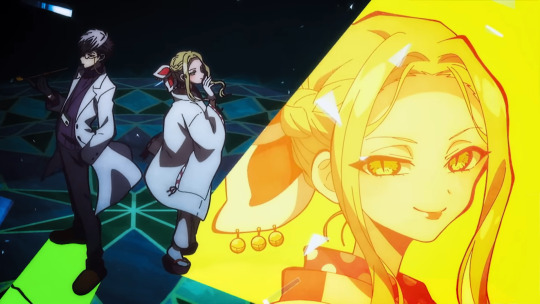
The story has a lot more things I love packed in to it- a dorky-but-still-deeply-unsettling villain gang who’s screwed up interactions are just as fun as our protagonists, yokai, A CURSED LIBRARY, some great ladies in addition to Nene, meditations on the nature of life, death, themes about fighting nihilism, and so on...I could seriously go on forever. It’s good stuff, and there’s lots of good weird supernaturals to meet.
The story’s also got tons of intrigue! The overarching plot and Hanako’s Mysterious Past is still in the process of unfolding, but it’s been great drama every step of the way! As mentioned before, the story also really relies on funny character dynamics, interaction and development to carry the whole thing and balance the drama.
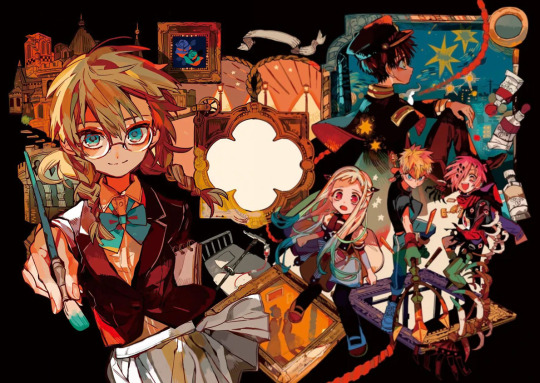
The anime itself does have some pacing issues bc they crammed a lot into the first season and rearranged some stuff- an entire two chapter arc was skipped and was unlikely to be covered in the anime and some parts are noticeably rushed. I still really like the anime and it’s a solid adaptation. I love how much of the manga’s detailed aesthetic it managed to keep as well as the amazing voice acting and it made a few small but important additions. But there are some notable bumps- of course this just led me to go binge the manga (up to volume 12 is legally available digitally) and BOY DO I NOW LOVE THIS STORY EVEN MORE.
Now obviously, just because it is Exactly My Shit in a lot of ways doesn’t mean Hanako-kun is the much quested for “unproblematic fave”, there’s several caveats you should probs be aware of- its shoujo vibes also mean some classic shoujo ~Problematic tropes~ and a couple shounen ones.
THE LIST:
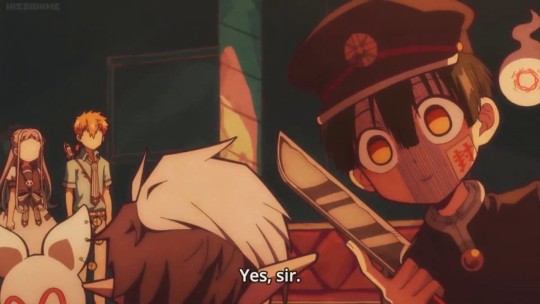
-Just as a general content overview thing: if this wasn’t clear the show deals heavily with death, body horror and other horror aspects. There’s heavily implied suicide and abuse and so on- as mentioned, the main character is traumatized and shows a lot of symptoms of PTSD, and Nene has to struggle to navigate her relationship with him because of this, as does Kou.
-Hanako himself has the whole ~loveable pervert~ and ~slightly possessive shoujo bad boy~ schtick going as part of his mischevious persona. In the anime so far, he never actually gropes or comments on not-in-his-naughty-mags-people’s breasts or anything of that level thankfully, but he’s very flirty, clingy, will loudly bring up porn, fond of the ol’ *says something that purposefully sounds sexually possessive* HAHAHA U THOUGHT I MEANT SOMETHING DIRTY RIGHT LOL ACTUALLY I DIDN’T.”
(My unnecessary ‘this part is kinda interesting!’ ramble: Nene always lists “sexual harassment” among Hanako’s flaws (she loves listing them), but doesn’t get visibly uncomfortable with his flirtiness or seem to mind it most times, which at least makes the whole thing more tolerable for me.

(since she doesn’t seem to mind that part and its clear he does it bc of actual affection for her, it’s actually p. cute how huggy he is.)
The one time it does cross the line and genuinely upset her, it’s treated seriously, Hanako is genuinely regretful and apologizes. That’s one of my fave moments in the story and the way it’s handled is well done.
This incident that he’s honestly pretty socially clueless as kid who died young and a lot of his bravado is to cover that up and keep people at a distance- this is a trope into itself that can use unpacking but I do at least appreciate that this is a considered character trait that’s part of his whole messed up package rather than something that thrown in there Just to Be a Fanservice Trope. (Especially since the manga confirms he never acted particularly pervy while alive, further cementing this is an affected persona).
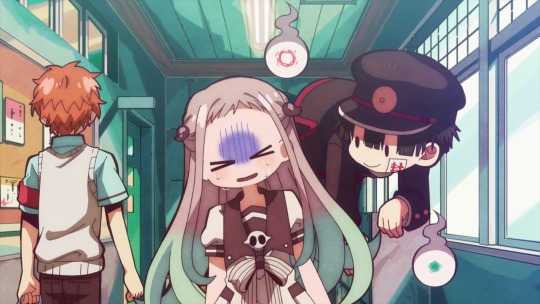
-There’s a running gag around Nene’s insecurity over her thick ‘daikon shaped’ ankles and boys treating her badly for it.
One one hand, her body image issues are relatable, on the other, it feels cruel and annoying just how much the show finds ways to bring it up and humiliate her over and over again.
(My unnecessary “this is part is kinda interesting” ramble:The one thing i did realize that despite bringing it up constantly, we at least have no “i’m going to do this to lose weight” or “go on a diet” rhetoric,like this is just part of Nene’s body type and she knows she can’t change it? Which is kinda interesting. And I’ve spotted what might be foreshadowing something plot relevant’s going to happen with her ankles (I DON’T KNOW HOW, BUT GOD I PUT NOTHING PAST THIS STORY) so uh yeah??? either way it’s not good tho)
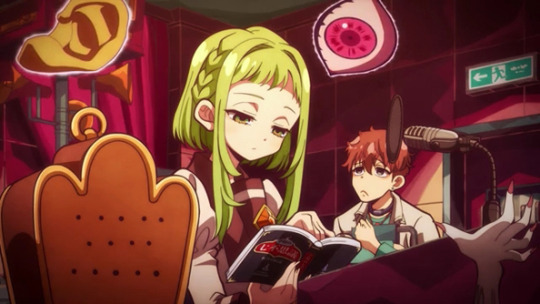
-”Obsessive and twisted love” is a running theme in this story, and while it’s generally acknowledged as unhealthy, it can be played for comedy in a way that could make viewers/readers uncomfortable. There’s a couple characters who’s entire thing so far is “obsessively in love with this one person” (and the one only focused on in the manga so far is one of the least interesting characters tbh ugh)
-The antagonist of the show is a member of a main character’s family, and the manner he acts towards pretty much everyone, including (and really especially) his family member, verges on seductive. This is presented as deliberately unsettling and treated as a marker of how unstable and scary he is- and though the backstory between them hasn’t been fully delved into, it’s pretty much all but confirmed he abused this family member physically and emotionally.
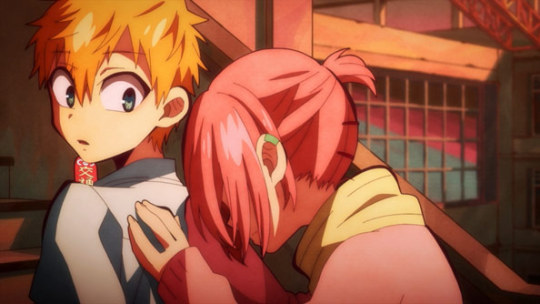
-The story has like, A LOT of queer subtext and pretty-heavy queer coding for one character especially, but the few times queerness blatantly comes up in the story, it’s played as a joke in the “haha that’d be kinda weird” way (aside from the rando boys who have a crush on Teru, handled pretty neutrally). It’s not as malicious as a lot of animanga can get (ONE MANGA INCIDENT ASIDE), but it’s something to Be Aware Of, and it makes it clear we’re unlikely to see subtext rise to text and makes some moments feel baity.
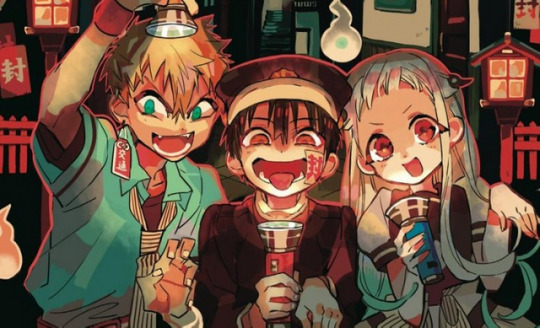
-And probably more I might have missed! The manga also has Some Shit in addition all the Good Shit that hasn’t been adapted yet, an early arc has Hanako crossing a serious line etc.
BUT despite how messy it is, I think it’s clear I have a lot of love for this story. In fact, I wouldn’t trade away a good chunk of its messiness (DEFINITELY SOME JUST NOT ALL), it kinda works for the characters and works in the “this story really feed my inner teen” way. Some of the trashy parts are exactly My Trash, basically.
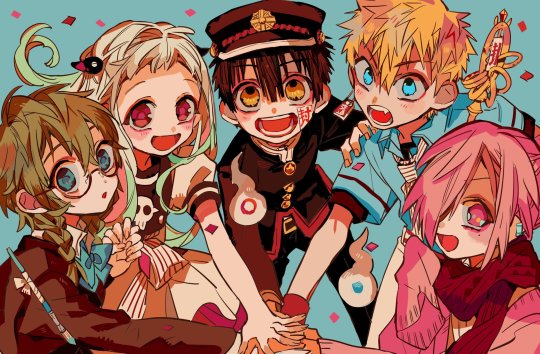
So, I knew I’d ramble on for a while when I talked about his show, but if you’ve read this far, thanks, and I hope that means you’re gonna check out and maybe enjoy this story, bc i need more people to join me in Hanako Hell.
#toilet bound hanako kun#jibaku shounen hanako kun#jibaku shonen hanako kun#winter 2020 anime#anime overview#hanako kun#nene yashiro#yashiro nene#kou minamoto#minamoto kou#yugi amane#amane yugi#my reviews
125 notes
·
View notes
Text
The Beauty of Red Riot’s Origin Story: Episode 72 Analysis (LONG POST AHEAD)
Well, here we are! I’ve been waiting ages to watch this episode, and now, it’s finally done, and I am more than happy with how it turned out. I’ve seen it in both Japanese and English, back to back, and both Toshiki Masuda and Justin Cook knocked their performances out of the park, and the emotion conveyed in their voices only made our boy’s origin story that much more emotional. But WHY is it so emotional? What makes such a seemingly ordinary backstory have such an impact on a viewer? (Especially viewers like, you know, US). Well, this is the purpose of this lil analysis here, so let us explore how Kirishima’s backstory contributes so nicely to his character. (Disclaimer: Manga screencaps are not my translation).
Let’s start from the beginning:

This panel shows us what we already knew to begin with: Our boy Kirishima is good-natured, stands up for others, and has strong, manly convictions. Nothing special, really, and the revelation that he was like this long before he entered UA is a great foundation for his character. In that regard, he has a similar foundation to Deku, but what differs is their struggles. Now, we know Deku grew up without a quirk in a society where quirks have been thoroughly normalized, but what does Kirishima struggle with, if anything? Is that even possible, what with him being so outgoing and boisterous?


As it turns out: yes. It’s VERY possible. This is where we see that our Red Riot is not as infallible as we may have thought. Yes, Deku had a hard time growing up without a quirk, and while Kirishima was born with a quirk just like most others, he grew up being ashamed of it, which if you think about it is a lot worse in some ways. Quirks are hereditary, and for many people, including Kirishima, quirks are also an important part of one’s own identity. This can inspire feelings of depression and even envy towards people with “better” quirks, like Mina. In contrast with Kirishima’s more traditional view of heroism and chivalry, Mina has a flashy quirk and bubbly personality, which is really effective for diffusing the situation with the bullies. This is where Kirishima’s manliness fails him, and no, not because he got shown up by a girl (thank GOD for that). It’s because heroism in the “modern” age favors heroes who can provide entertainment. Someone who’d be right at home in, say, the idol industry (like Mina). According to his friends, Kirishima’s hardening quirk, which he sees as boring, would not fly in today’s society. Now, Kirishima doesn’t care so much about what his peers think of him, but he’s still ashamed of his quirk, so he trains to harden his body and spirit, both literally and figuratively:

Also much like Deku, Kirishima has his own hero he looks up to: Crimson Riot. He serves as Kirishima’s main source of inspiration. It’s where he gets his hardline traditionalism from, and also how he copes with having a quirk he sees as “boring”. Again, this is where he and Deku differ. Deku looks up to All Might in a fanboyish sort of way, which inspired him to strive to be a hero as well. Kirishima, on the other hand, not only sees Crimson Riot as an inspiration to be heroic, but also because they have similar quirks. It’s only natural for a child who’s been conditioned be ashamed of something they can’t help. It’s something I can personally relate to as someone who struggled a lot with sexuality as a teenager, and something many others can surely relate to as well. This makes our boy an effective source of inspiration as well.

However, no matter how hard he trains, both physically and mentally, Kirishima still can’t train himself to not feel fear. It’s only natural for ordinary people to feel fear. After all, fear was what kept humans alive back when they were just starting out. Still, this goes against all of Kirishima’s ideals of what being a hero means. Sure, he has no problem standing up to some regular school bullies, but unlike him, Mina didn’t hesitate to act when her friends were cornered by a 30-foot tall villain in the street. She’s a prime candidate for UA, so what chance does he have of getting in if he can’t stand up to a literal supervillain?
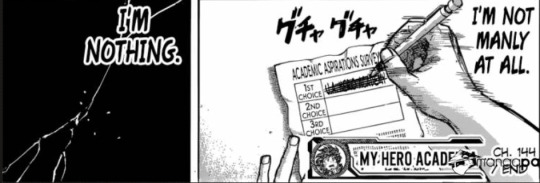
So, he gives up on his dreams of getting into UA. He didn’t act when it mattered. That was it for him. Even worse, the incident where Deku saved Bakugou from the slime monster made headlines. It was good that Horikoshi showed how this affected Kirishima, who was totally uninvolved, because it makes you think of what exactly that implies. After that incident, Deku was miraculously given a powerful quirk by All Might. Maybe if Kirishima were the protagonist, he would have been so lucky, but that’s not the case (more on this later). Despite this, Crimson Riot blesses Kirishima in a more indirect sense:
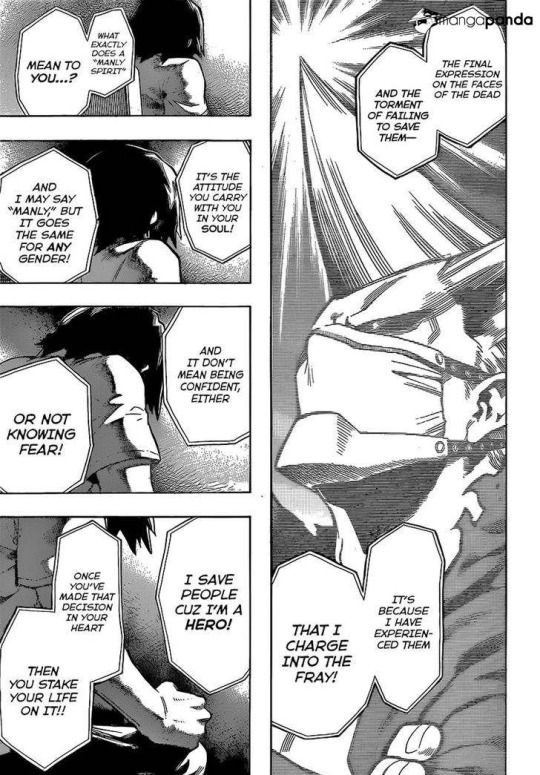
In his frustration, Kirishima throws a book against the wall, and coincidentally, this hologram-looking thing of Crimson Riot starts playing, and it’s exactly what he needs to hear. As he listens, Kirishima realizes that not even Crimson Riot is immune to fear, but he copes with it by telling himself that failing to save someone because you didn’t do anything is far worse than charging in and giving it your best shot. That way, he can live his life without regret, which is, from then on, what Kirishima strives to do.
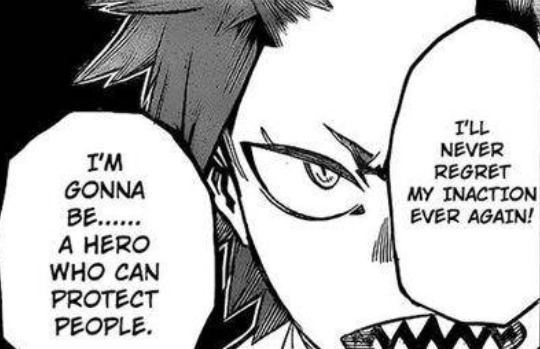
Finally, with a fresh motivation to get into his dream school, our boy pulls through (and gets 2nd place in the entrance exams!). To commemorate this, Kirishima dyes his hair and vows to leave his past behind him, and Red Riot as we know him today was born.
This should surprise absolutely nobody, but Kirishima’s is my favorite backstory in the whole series, and to conclude this lil essay, I’m going to explain why. As I said before, his backstory is something a lot of people can resonate with. Feeling shame and self-doubt is something many people go through, and it’s prevalent with people who have conditioned themselves to feel ashamed of something beyond their control. Coming to terms with my bisexuality was a struggle for me, so I can definitely relate indirectly.
This ties into the SYMpathy vs EMpathy argument. A lot of backstories in My Hero Academia, or even media in general, are tragic in a way that not everyone can relate to (not criticism, just observation). Let’s take Todoroki, for example: he was essentially quirk-bred by his father and was abused by him, being trained to the point of overexertion. On top of that, his mother gave him the scar over his left eye, and he has carried that trauma with him his whole life. Not everyone had such a toxic upbringing, but Todoroki sure did, and many people feel sorry for him. In other words, they sympathize. Kirishima, to contrast, had a much healthier upbringing, but has a lot of internalized self-esteem issues that everyone can relate to (or empathize with). While sympathy is the capacity to feel sorry for someone, empathy is the capacity to UNDERSTAND someone. Don’t get me wrong, tragedy is often a crucial element to a story’s narrative (if it’s done well), but it’s sometimes more cathartic for the viewer to see a character overcome more everyday struggles, especially if they can understand them on a fundamental level.
The last argument I will make goes back to what I was saying about Kirishima not being the protagonist, and I think if he WERE, his origin story would not be nearly as impactful. One might say that Kirishima embodies the more stereotypical “hot-blooded” shonen protagonist than Deku does, and I agree to some extent. However, it works better for him to be a supporting character. In most shonens (like Naruto), the protagonist’s backstory is established right away, and as such, the viewer always sees their character in the context of what they were like in the past (we get it STOP SHOWING US THE FUCKING SWING--) In Kirishima’s case, his backstory comes into play much later, and by that point, we are already so familiar with his Red Riot persona that the revelation that he wasn’t always so eager and optimistic hits that much harder, and seeing how it contrasts with Kirishima as we know him in the present feels more rewarding. Yes, we get to see bits and pieces of it early on, like when he feels inadequate after meeting Tetsutetsu and seeing that their quirks are nearly identical, but seeing those feelings fully presented in his backstory only serves to drive that home. In short, we see, at a glance, how far he’s come since then, instead of being forced to watch the whole process from start to finish, and it works really well.
Another common trend among shonen protagonists, as I said before, is their tendency to be blessed with miraculous new abilities to make them special (and that includes Deku). Obviously, that didn’t happen with Kirishima. He had no pro-hero mentor to guide him, nor an all-powerful booster quirk to bolster his hardening abilities. He got to where he did through sheer perseverance and hard work, with only his idol’s words to keep pushing him forward. While Deku also had to work hard to get to where he is, fortune was on his side, and the fact that Kirishima pulled himself up by his bootstraps (so to speak) is, to me, a lot more admirable.
And THAT, my friends, is the core of why Kirishima means so much to me as a character, and even if he doesn’t become the #1 hero in the story, he’s my personal #1 hero. So, on that note, thank you for all your support, and as always...Stay sturdy!
tl;dr I FUCKING LOVE KIRI SO MUCH YOU GUYS
44 notes
·
View notes
Note
mx savrenim! mx. savrenim! I have a writing question: Im writing a story about people who can see the future, and I'm wondering how you made it feels more like a memory not like, a gut wrenching tragedy? Its deffo painful, but Im pretty sure you mentioned wanting to give it a happy ending? If so: how. The concept of future vision is so cool but the implications and the way it plays out is horrifying and heartbreaking rip. I just wanna give my characters some chance at a happy ending
gods okay this is a good question that I have a lot of Weird Strong Feelings about bc time is the single thing that I have the strongest opinions about let’s go under the cut
so the thing that makes your question interesting to me-- “how do you make a story with future powers not a gut-wrenching tragedy”-- is that..... to me, at least, there is absolutely nothing inherent in the setup of future-seeing powers that should imply that the story should be a gut-wrenching tragedy? your problem is assuming that there has to be anything tragic involved. free yourself from that perception and you will be free to write whatever you want.
ifmlam is a gut-wrenching tragedy right now because the feeling that I was going for was “hmmmm the exact gut-wrenching feeling that The World Was Wide Enough makes me feel” and it’s having a happy ending because I decided to write a fic bc “goddamnit I need a fix-it, like, right now.” Seeing the future is cool but it’s also just a plot-and-setting device. and the story feels the way it feels because I designed how it works around exactly how I wanted it to feel?
my current other major project, trash novel, is about a seer who hunts down other seers for dramatic stop-the-world-from-devolving-into-war-and-maybe-ending reasons. except the vibes are... SO different. the vibes are “shit there’s like a dozen way way overpowered teenagers and twenty-something-year-olds who hold the fate of the world in their hands except they’re being dumb assess getting overly involved in personal drama with one another and are maybe going to blow up the planet.” and so instead of this quasi-religious worldwide honor around a single Seer and visions of the future that work one particular way and the main character being this poor fragile darling that needs to be protected and the reverence with which the plot treats the usage of future-powers, the main character of the opus series named herself “Fuck You” and has the power to see like ten seconds tops into the future and uses it to be really fucking good at magic fistfighting and accidentally gets involved in trying to take over a foreign/soon to be enemy government while trying to make friends with the ambassador that it’s her mission to protect him and like spy on that government to make sure they’re not messing with the future, but because he’s really pissed off at his ex and his shitty parents kind of for trying to force him to marry his ex and also his entire home country for siding with his ex he decides to take advantage of the fact that Saes thinks that overthrowing a government is maybe appropriate friend bonding activities to Take Revenge. and overthrow the government. meanwhile his cousin just outright admits in her second scene that she is trying to take over the first their government in then the world and is like 90% of the way there and really isn’t trying to hide the fact that she has committed to a plan that makes everyone think she is The Villain but Saes in particular bc Saes doesn’t want her home country to be conquered, but while Saes thinks this makes them moral enemies Asterna thinks that Saes is very hot because Saes is the single person who can beat her in a fistfight. they get into a misunderstanding fake-dating relationship for at ~80k words of the first arc. the ex is also trying to take over the government partially bc he feels the family pressure to continue their influence and partially bc he’s still in love with Luka and wants to try to win him back. at least three main characters have very poorly thought out one-night stands with other characters just for spite. there’s a character whose name is “Godkiller.”
you can probably tell from the description that it’s very VERY different vibes from ifmlam. there are seers with more longreaching abilities than 10 seconds in the setting, who are trying to use their powers to seriously manipulate outcomes of events, and some deep political implications of that; it’s not all flashy ridiculousness. there are parts of it that get tragic (gods do parts of it get emotional and gods are some of those emotions tragic), but it’s never terribly tragic for very long, and it never feels like a heart-wrenching tragedy as a genre. everyone is a gay mess, extra emphasis on the gay AND the mess, and it reads like ridiculous action drama intrigue almost like a DnD campaign?
and it’s because of both (a) the seer powers that are being highlighted work differently but also (b) the seer pov character has a fundamentally different perception of themselves. Aaron Burr sees himself as pretty much a McGuffin and he hates it and there’s a large portion of his character and character arc and hence the plot itself that revolves around him not feeling like he has any sort of control over his life or the impact of his powers. he’s afraid of himself and what he can do, he’s afraid of letting people in and being used, he’s afraid of the impact that he or someone wielding him might have on the world, and he doesn’t quite see himself as a person, more like a glass statue of one housing powers -- and that contributes to the tragedy and vastly affects the tone of the whole thing. when the viewpoint character feels helpless, when the viewpoint character doesn’t believe in themselves, when the viewpoint character is pretty much a McGuffin: incredibly powerful and useful to powerful people, but unable to control their own fate -- that gives the story a certain feeling.
Saes Imirin is nothing like Aaron Burr because Saes isn’t afraid of herself. Saes is completely at peace with what she can do, and actually thinks it’s pretty cool. She’s working for the people she’s working for because she’s decided that’s probably where she’ll do the least harm in the world, and also because she likes her apartment. if she changes her mind she changes her allegiance. she has stared down armies and has never really feared for herself, because she’s a fucking badass, and she knows that she can always pick the future where she wins so why should she ever feel afraid.
if you don’t want your characters to feel tragic, then don’t have them be afraid of themselves. don’t have them doubt themselves. but also, construct the way that future-seeing powers work so that they’re not set up to be a tragedy. the biggest being the most important pair of questions: how accurate/specific are the powers? and how unchangeable is the future?
Saes Imirin’s powers are 100% accurate and 100% specific, albeit contained to usually one to three but at most ten seconds. The future is also 100% changeable; the way her powers works is that she sees all possible futures and then physically moves the way that she did in the one where she’s won. Aaron Burr’s powers are..... death visions I’d put at, like.... 90sh % “accuracy”? in that they always show a possible and in fact usually most probable for the timeline we’re on now sort of death for someone. but they’re also very changeable. but time itself has a momentum and “pushes back” against those changes in the plot of ifmlam (someone doesn’t die in one duel will die in another, etc) which lends to a strong feeling of inevitability despite the relative amount of freedom those powers have.
imo, future-seeing usually lends itself to tragedy when it’s about seeing something terrible/attempting to subvert something that cannot be fixed because it is the future. if you establish early on that all visions/prophecies must come true exactly, that will usually put a fair amount of tension on your plot and it will make things feel tragic, especially if characters end up getting a future that they really really don’t like. the more unchangeable things are, the more it usually tends towards tragedy.
(I say “usually” because, like. I’m still waiting for a story in which future-seeing is absolute and someone gets a prophecy that “and if you choose to go forward and step through this room your fate will be sealed, you will die on this specific day in this exact way and nothing in the universe can change that”, the character goes “cool”, does it, and promptly begins taking advantage of their immortality up until that day to do Utterly Ridiculous Things to become a weird hyper luck-based superhero of, like, “I can jump off this building bc in the vision I was fine and unhurt so I can’t get wounded in any sort of way that’ll make me unable to run and jump around” “I can totally try eating this mystery goo let’s see what it does” “hmmm the enemy fired their superbomb into the heart of our capital guess I just have to sit here next to it so that it will keep malfunctioning in some strange unspecified way and not going off because it can’t kill me here and now my fate is set in stone” etc. just. someone give me that comedy p l e a s e. I’m picturing Monty Python level of shenanigans.)
but yeah, usually, the more set in stone a future is, the more likely a story is to take a turn for the tragic, because when the future isn’t ~set in stone~ prophecies function more as useful warnings that can be interpreted to do useful things and save the day and not terrible foreboding omens of doom. high accuracy with high changeability is a cool superpower. low.... specificity, at least, leads to stories where usually you go “oH SHIIIIIT” afterwards as you get the end and the last thing clicks in place and now the entire plot in hindsight is So Much Different and they only lend themselves to tragedy if they’re useless as warnings and are just “fuck oh THAT’S what it meant and if I understood it I could have changed it”. and then inherent low changeability is both easiest to lend to tragedy and imo the hardest to write because you write yourself into a corner? (and you also make some pretty deep philosophical statements about determinism and free will depending on how you characterize time.) but so long as everyone has a chance to change things, the story won’t feel hopeless.
this has gotten long and rambly bc it’s ungodly o clock in the morning and, like, if the heart of the thesis of your story is “knowing the future is Fucked Up and Fucks You Up” and your story is on the deep seated societal implications about a world where some measure of seeing the future exists, like.... there are ways in which things might be tragic, but there are ways to counter that by making things mundane? a la lightening benders in legend of korra working at electricity plants. having seers with tiny mundane powers and/or who don’t really care about their powers and don’t use them too much or who just think of them as annoying side noise, but at the heart of it, oops stealing also from mob psycho 100 bc oops I just rewatched it and am mildly obsessed with it and its message and just dear gods how it manages to pull off its emotional impact....
psychic powers are just another trait. like people who can run fast or who study hard or sing really well or have strong body odor, or have psychic powers. they don’t make you any more special than anything else. who you are and what you do isn’t set in stone, it’s choices that you can make.
and finally, if your world is tragic bc you’ve decided to lean into the “the public perceives seers as special / dangerous / other “ and so you don’t want to adjust how the powers themselves work and how the public sees it, there’s always the trick of just, like.... let characters’ actions have meaning. let them win. and it won’t be a tragedy, not really.
13 notes
·
View notes
Text
Jenny’s Song
Let’s talk about the history of Jenny, the symbolic importance of her character and the actual song itself and what it could mean.
Who is Jenny of Oldstones exactly?
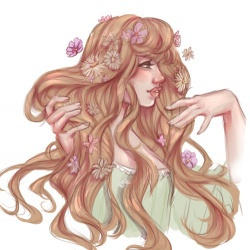
Jenny of Oldstones, by Rae Lavergne
Jenny was the wife of Prince Duncan Targaryen, the first born son of King Aegon V (also known as Egg) and heir to the Iron Throne.
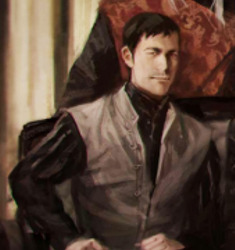
Duncan Targaryen, by Karla Ortiz
Duncan was originally betrothed to an unknown Baratheon daughter, but while in the Riverlands he fell in love with a “strange, lovely and mysterious” woman, aka Jenny of Oldstones.
Despite already being engaged and the fact that there was a severe class difference and protest from his family, the small council and others, the two nonetheless got married. Or I guess more accurately stayed married.
King Aegon V tried to break up the marriage, but to no avail. Duncan, in the end, was given a choice -- be the heir to the throne or stay married to Jenny of Oldstones. He chose the latter and became known as the Prince of Dragonflies.
Now this story is important for several reasons.
For one thing, the choice these two made impacted the existence of current characters and their own family lines. So, let’s get into the literal and historical implications of Jenny and her Prince of Dragonflies.
The Effect on the Present
Jaehaerys II was named heir and later became king, when Duncan abdicated the throne. He is the founder of the specific line that is Daenerys’ immediate family, him and his sister-wife Shaera were the parents of Aerys and Rhaella, who are Daenerys parents and Jon’s grandparents, on his father’s side.
You may think those two pairs of siblings may have ended up together anyway, without Duncan and Jenny, since they are Targaryen siblings and all that, but not so much.
Jaehaerys and Shaera were betrothed to Celia Tully and Luthor Tyrell respectively, but were in-love with one another. Despite their parents marrying for love, they were forbidden to do the same, mostly because they were siblings and Aegon and his wife Betha Blackwood wanted to end that tradition.
But because Duncan married for love, Jaehaerys and Shaera followed suit and it goes further than that.
Jenny brought the Woods Witch to court and she proclaimed that the Prince Who Was Promised would be born of the line of Aerys II (Mad King) and Rhaella. Hearing that, Jaehaerys arranged the marriage between his own son and daughter, who had three children Rhaegar, Viserys and Daenerys.
Because of Duncan and Jenny, Daenerys and Jon (and their right to the throne) exists even at all.
And there is more.
Baratheon Family
Because Duncan snubbed the Baratheon girl, the Stormlands rebelled against the Crown and lost.
Aegon sent his youngest daughter Rhaelle to be betrothed to Ormund Baratheon, which created the current or most recent Baratheon Family - Robert, Stannis and Renly’s grandmother was Rhaelle Targaryen.
In the books, not so much the show, Robert and others even kind of use this as a “justification” for him having the throne, which is basically bullshit. He took it and that’s that.
Tyrell Family
And while this might not be the case in the show, Luthor Tyrell was betrothed to Shaera Targaryen and because she married her brother, he instead married Olenna Redwyne, which created the current (now gone in show) Tyrell family.
And while not directly related to Duncan Targaryen, Ser Duncan the Tall the namesake of this Targaryen Prince is an ancestor of Brienne of Tarth.
So, a lot of the families currently in the show exist because Duncan married Jenny and chose her over the throne.There was a ripple affect with Duncan’s choice that we can still see.
Symbolic Implications
There are a lot of couples we’ve been shown that are a reflection of this couple, but nonetheless fall short of the actual couple.
They main factor being that Duncan abdicated his throne for Jenny, he chose love over power and his duty. And many couples fall short on that idea.
Sidenote: To be clear, whether or not choosing love is a good thing or not in this world is highly debatable. But going with the moral of how Duncan and Jenny are told, love is the positive thing. But the flaws are pointed out to us.
Daenerys and Jon

First off, they have the same first letters. Daenerys and Duncan// Jon and Jenny, so that’s an interesting parallel for the two couples.
In the show, Podrick’s singing ends just as Daenerys and Jon’s scene in the crypt begins. The Florence + The Machine Lyric Video ends on Jon and Daenerys’ crypt scene, with the line “the ones who loved her the most.”
This seems to be strongly indicating to us, the audience, that we should see a connection between these two couples (if you know the backstory.) But I would argue, the overall surface of Jon and Dany is a closer match than the actual relationship itself.
To be fair though, Jon did give up his throne to Daenerys and Daenerys herself stated that she was in the North, because she loves Jon. Her being in the North is presented as her giving up her desire for the throne for Jon.
So both are meant to be a Duncan-figure to the others’ Jenny.
And yet, it’s still not the same.
Jon didn’t give up his throne for Daenerys. He’s gave it to her. It’s not the same kind of choice, in my opinion (and depending if you believe in Pol!Jon, he’s not giving it up for love).
But, let’s count it for now, because do we think he’s going to do the same thing, again. What would be the point of bringing up Jon’s claim to the throne and then just have him give it up to Daenerys, a repeat from last season.
I don’t think Jon is going to be giving up his claim to Daenerys or for her, anytime soon. Mostly becauseof Daenerys and her own relationship to the throne.
Daenerys is also framed as a Duncan like figure, but is she? Daenerys might talk about her love for Jon and even believe that she is willing to give up her throne for him, but again is she willing to do it?
Sam brings that question right up to the surface, for both Jon and the audience. So the answer isn’t a straightforward yes, if it was the show wouldn’t be bringing our attention to it.
Daenerys’ primary focus when Jon was telling her the truth, was that he now had a higher claim to the Iron Throne than her own. That scene alone, I think disqualifies her as a Jenny figure and goes against her, as a Duncan figure as well.
And even her leaving her campaign for the Iron Throne is temporary, in the sense that she herself seems to see this as a slight change to her path, but not changing the overall course. Once the dead are gone, she was always planning on getting that throne and 7K. The Sansa and Daenerys scene confirms that.
Jon and Daenerys are no Duncan and Jenny, at least not in their relationship together.
There are two other couples who seem to fit the mold of Duncan and Jenny, more so.
Rhaegar and Lyanna

Rhaegar annuls his marriage to Ellia Martell (in the show) to marry Lyanna. And like his ancestor breaks another Baratheon betrothal. And the Lyric Video certainly does imply a Duncan and Jenny filter to Rhaegar and Lyanna.
And again, Rhaegar exists (like his sister and son) because of Jenny and Duncan getting married and Rhaegar was born during the Tragedy of Summehall…which we’ll note a bit later on.
Robb and Talisa/Jeyne
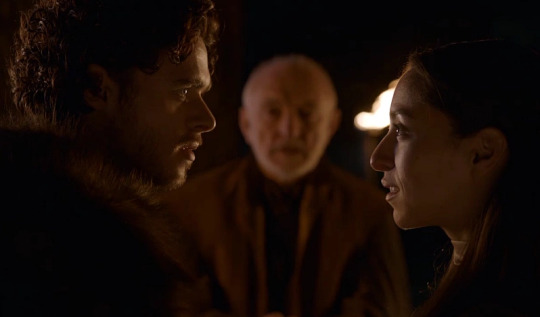
Robb and Talisa/Jeyne are more similar, in my opinion, to the story of Duncan and Jenny, particularly Robb and Talisa. Robb meets this strange and mysterious woman in the Riverlands (Talisa), while she is of noble birth in Essos, she is not of any noble birth within Westeros.
They get marry in secret and Robb breaks the arranged marriage that his mother arranged (like Duncan) that was meant to be advantageous to him and his family. And he refuses to give his “Jenny” up, despite the persistence of his own “Small Council.”
Furthermore, in the books, Catelyn herself hopes that Robb’s song in the end will be a happy one. That despite the current difficulties and struggles, it will all work out for the best.
However, neither Rhaegar nor Robb are Duncan. As both chose to keep their “Jenny” and their Throne. They didn’t make a choice and they both paid dearly and nearly brought the end to their houses.
You can’t have both your Jenny and your throne. You either choose her or the throne. And I would argue choosing the throne, is better than not choosing at all.
Daenerys and Daario.
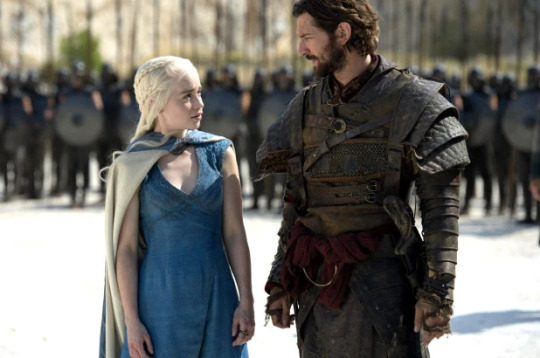
This connection isn’t really all that applicable in all honestly, but I thought it deserved mentioning.
Daenerys gave up Daario for her pursuit of the throne. While Daenerys said she didn’t love him or wasn’t in-love with him, so it was an easier choice for her overall. It still was a choice.
She chose power and what she assumed might be a future duty for her as Queen. I would say her making the choice, puts her in a better spot than either Rhaegar or Robb.
Now there is another pairing to consider.
Jon and Sansa
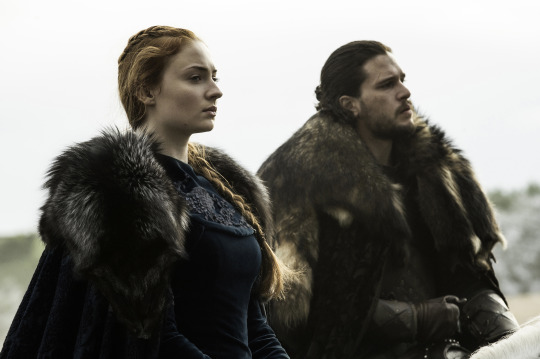
Jon and Duncan do have some similarities (which also apply to him and Daenerys, if he is the Duncan in that dynamic)
They are both dark-haired Targaryens and their fathers were Targaryen men, while their mothers were not of the Targaryen line.
Duncan’s mother was Betha Blackwood, Blackwoods are a noble family in the Riverlands who still worship the Old Gods. Jon’s mother is Lyanna Stark, while not from the Riverlands, the Starks as we all know worship the Old Gods.
And while this is more of connection between Aegon V, Duncan’s father rather than Duncan himself, Jon too can be seen an unlikely ruler.
Aegon V was also known as “Aegon the Unlikely” due to the fact that he was the fourth son of the fourth son. No one ever expected him to become king, because he was one of the spares not the heir.
Jon is also viewed as the fourth son of Ned Stark. While Bran and Rickon are younger than Jon, the fact they are trueborn bump them up, making Jon the fourth son.
And because Ned Stark had five trueborn children, Jon was never to going to inherit Winterfell in any normal circumstance. And no one knows, or didn’t know until now, that he was actually Rhaegar’s child, so again, he’s a dark horse in the race to the Iron Throne, at least for the other characters.
And finally, Duncan was known as “Duncan the Small” because his namesake was “Ser Duncan the Tall”. And Jon’s height has been brought up quite a lot, even in this most recent episode, specifically in the scene of Sansa and Daenerys.
Sansa and Jenny, also have some interesting parallels and connections.
The prominent one, being that Jenny of Oldstones was one of Catelyn’s favorite stories and Catelyn is from the Riverlands, like Jenny.
While some fans are currently speculating that Jenny was a red-head, to my knowledge there is no actual evidence of that at all. But we don’t actually know, so maybe?
There is another connection to Sansa, it is a stretch, but I see a connection.
Jenny has a very fae-like quality to her and her story in general. Her story and I think (for me at least) the association with Dragonflies bring to mind fairies and how they appeared in Medieval Stories, particularly those involving knights. Now Westeros doesn’t have fae/fairies, but…
Jenny, apparently, claimed to be descendent of the Old Kings/First Men and also the Children of the Forest. She is described as being “strange, lovely and mysterious” and so maybe she was a “fae” of some kind or a descendent of the Children of the Forest.
Fans have speculated that her claims have some truth to them. But I’m not entirely convinced if Jenny herself was magical.
Similar to Sansa.
Sansa is currently the only Stark who doesn’t have magic in her storyline, but despite that, in the mythos of Westeros she is the one who people are starting to associate with magic. There are rumors, that Sansa magically killed Joffrey and escaped by turning into a wolf with wings.
Obviously, that’s not true.
But it’s still interesting that the non-magical Stark sibling is the one who is already being turned into a magical-tale for the people of Westeros. And that mythos might build overtime, especially as Sansa reunites with her siblings who do have prominent magical abilities.
And won’t that just confirm in people’s minds that Sansa is magical. And then later in the years, won’t future maesters be able to deny the existence of magic of the Three-Eyed Raven and such, because they know that historically King Joffrey was killed by the Tyrell family.
Similar to how the Maesters of Oldtown dismissed Jenny of Oldstones in season 7, while they were also dismissing the Three-Eyed Raven and the White Walkers (2 very real things)
Basically, and we’ll see if this turns out to be true in the end, I think both Jenny of Oldstones and Sansa Stark and the stories they became/will become is part of the blurred line between the real magic that exists and the fake, story-magic that is part of the smallfolk tall tales.
I’ve said this before, but I’m so interested in what the story of Sansa and her siblings will be in Westeros years later, because I’m betting there will be more than a few inaccuracies.
Sansa’s Wardrobe
The show, has made a very interesting connection between Sansa and Jenny and her Prince of Dragonflies, all the way back in the beginning.
In seasons 1-3, Sansa wore dragonfly, moth, and butterfly imagery.
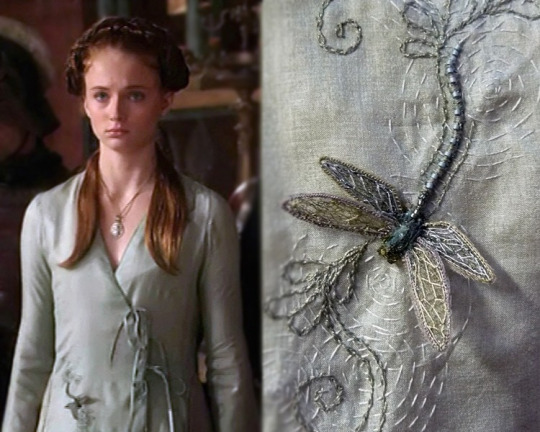


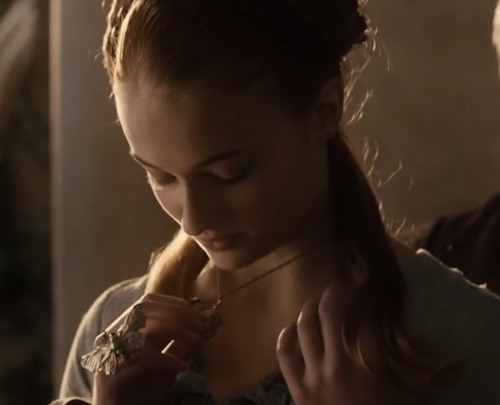
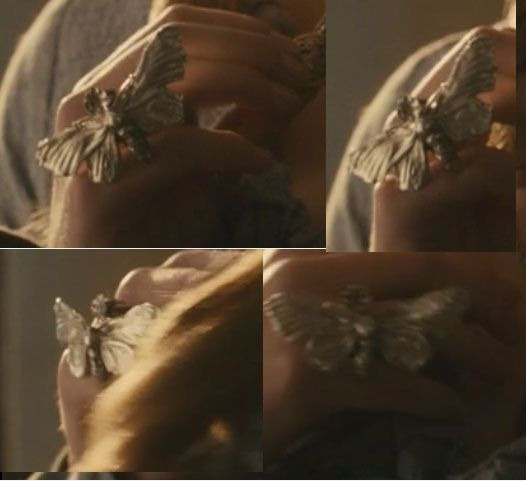
Now the Dragonflies/Moths/Butterflies might have only been used because they represent delicacy and femininity, but also the ability to adapt, change, and evolve. They are metamorphosis and so is Sansa Stark. And that might be it, nothing more.
But the inclusion of the acorn collar for Arya, really does make me think the dragonflies to some extent, links Sansa to Jenny of Oldstones and her Dragonfly Prince. At least, in my opinion.
What acorn collar?
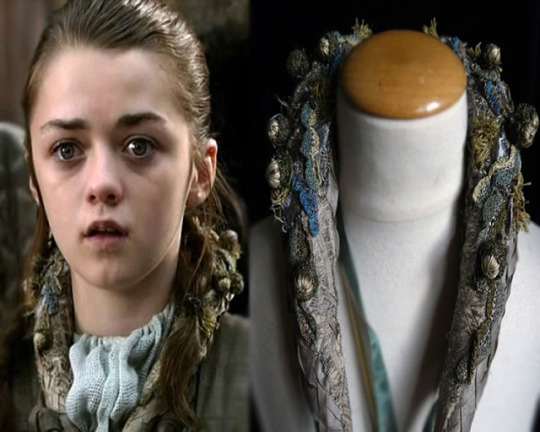
In season 1, Arya wore an acorn embroideredcollar to the Hand’s Tourney. While Sansa was already wearing dragonflies before this scene, it’s an interesting connection.
Not only is Sansa wearing her Dragonfly necklace and Moth ring as well in this scene, but this is where Sansa (and Arya) first meet Littlefinger. In the books, it is mentioned how he and Catelyn would play Duncan and Jenny when they were kids.
Now the acorn collar is a clear reference to the acorn dress Arya wore in the books when she was at Acorn Hall with the Brother-Hood of Banners. And during her time with the Brotherhood, Arya also met the Ghost of High Heart who is the Woods Witch (or believed to be), the same one from Jenny’s story.
She demands a song, known as Jenny’s song (the one we hear in the show). Now Arya notes that the song sounds familiar, but she doesn’t actually know it, however she knows Sansa would’ve known it.
In addition, some of the Ghost of High Heart prophetic dreams relate to Sansa. Joffrey being poisoned at his wedding and Sansa being the one carrying the poison, for instance.
Now in the show, Arya never meets the Ghost of High Heart and a lot of the culture and mythos of the world itself isn’t part of the show.
But still, that link between Sansa and Jenny of Oldstones exists, with Sansa’s dragonfly accessories and Arya’s acorn collar.
Confirming that Michelle Clapton is pulling, some of her costume details from the books and it’s interesting she chose dragonflies and not Jonquil flowers, which I would argue are more closely associated with book Sansa.
So are Jon and Sansa, a reflection of Duncan and jenny?
Well it depends. I think Jon could definitely give up his claim to the throne and abdicate it to someone else, depending on the circumstances.
In order to protect Sansa? A definite possibility.
Shoving the marriage proposal (idea) to Daenerys out the door, now that he knows he’s a Targaryen and Sansa’s cousin. Maybe?
We’ll have to see, though, I don’t think will get that in any real or clear-cut way.
But, is that the same as Duncan and Jenny?
Well not really, but I would say it’s pretty darn close.
I would argue whether or not the throne exists in the end, Jon wholeheartedly and genuinely choosing to give it up in some way for Sansa, would be the important thing. Not to Sansa, but for her.
And again, if Rhaegar and Lyanna and Robb and Talisa can be reflections of Duncan and Jenny, despite those two men never making a choice, than Jon making a choice would be closer match.
But we’ll have to see.
Jenny’s Song
The actual song, despite all of the above, is not about Duncan and Jenny. Or least not entirely. The song is about The Tragedy of Summerhall.
Basically, Aegon V was trying to bring back dragons into the world and his failure led to a fire that killed him, Duncan Targaryen and Ser Duncan the Tall and likely others.
Sidenote: Rhaegar believed, for a time, he was The Prince That Was Promised due to the events of Summerhall, him being born amidst smoke and salt and all that. Later, he started to believe it was his son Aegon Targaryen (not the Jon Snow son, the one with Ellia). So again that prince that was promised and Jenny of Oldstones connection, comes up again.
It’s unknown if Jenny actually died at Summerhall or if she chose to stay there until the day she died, dancing with the ghosts of those she’s known and loved. Now all alone in the world. I’m incline to believe the latter, but it’s vey possible she died as well and the smallfolk would claim to see her ghost.
We don’t know.
What we do know, is that Winterfell is basically being marked to be a place of similar tragedy.
Soon the characters who survive are going to be surrounded by the ghosts of Winterfell. And the song overplays some of the main cast and groupings/pairings.
The Hearth Gang – Podrick, Tyrion, Jaime, Davos, Brienne and Tormund
Gilly, Sam and Baby Sam
Sansa and Theon
Arya and Gendry
Messandei and Greyworm
Jorah
While we could go into the specific lyrics, overplaying the shots, I don’t know how important that actually is (maybe I’m wrong).
It seems clear to me though, that the people shown are going to lose the others who were also shown. Soon, some of the pairings will no longer be pairings. And the living will have their own ghosts haunting them, ghosts they’ll never want to leave.
Basically the song, as of right now (perhaps future episodes will change this) is not about Duncan and Jenny falling and love and being together. It’s about losing your loved ones and being left alone in this world.
Death is coming.
And very soon, some of these characters will have the burden of remembering those who have fallen and keeping them alive in their memory.
#Game of Thrones#GOT#Jenny of Oldstones#Jonsa#Jon Snow#Sansa Stark#Duncan Targaryen#Jenny's Song#Arya Stark#JOnsa Meta#Got Meta#Got Analysis
1K notes
·
View notes
Text
Let’s think about...
A number of intriguing questions were discussed in our last class. Three different subjects make the human being concerned about; "Free Will", "Artificial Intelligence", "The end of everything". Can those things be related? Dr. Wassem our lecturer asked us to listen to a series of podcasts on his website called "Bridging the Gaps ", where he has an interview collection with researchers, explorers, and thought leaders from around the world.
Let's know a little bit about each subject above.
"Free Will” Through the Lenses of Philosophy and Neuroscience with Dr. Alfred Mele
The aim of this talk is to understand if Free will really exist. Dr. Alfred Mele, explains that Free will can have a variety of points of view. Philosoficly, It can be understood as an act freely or decide freely, without nobody pushing you around. It means that an individual can make a decision based on information, reasons, or previous experience acting with sanity and rationality. Furthermore, it is believed that some decisions can be imposed by the earlier decisions or consequences that an individual made.
On the other hand, Neurological experiments conducted by neuroscientists show that some decisions can be made unconsciously, for example, when a part of our body involuntarily moves after an extern disturb, which implies that decision was made unconsciously before a subject became aware of making this decision. Perhaps, it can make us believe that Free Will can be an illusion.
However, the question remains "does free will exist"? Those thoughts make us think that we are not completely in control of our decisions.
The End of Everything (Astrophysically Speaking) with Dr. Katie Mack
The idea of the end of the World can be a little bit scary. It can be just like watching a catastrophe movie that the main character tries to save the earth's planet. Could this happen? In this talk, Dr. Katie explains some different ways the universe could end astrophysically speaking.
One of these ends could happen at any time. "Vacuum Decay" is a supposed tragedy that our planet would vanish through vacuum energy. However, She said that this one is rarely possible to happen any time soon.
Another anomaly that can end the universe is called "heat-death". This one is the most likely that could happen in the future, and this one is related to the expansion of the universe. The Dark energy caused by the acceleration of that expansion could affect the entire universe which will become cooler, darker, and emptier because of this disorder and entropy.
Some people think that these possibilities could be a little depressing, and for others that it can be something good. Dr. Katie believes that it is more important we think about now, to find ways to have a sense of meaning in-universe and life right now.
Artificial Intelligence: Fascinating Opportunities and Emerging Challenges with Professor Bart Selman
Discussions about "Artificial Intelligence" are an intriguing subject that many people agree, disagree or do not have a formed opinion about.Developed systems using AI technology such as self-driving cars, machine vision, natural language processing, and medical diagnosis are now part of the modern world.
Sophysticads computing programs are being developed in order to solve problems and make life for everyone easier. For example, Professor Bart said that it can be used to solve mathematical problems that never have been solved for humans being.
Furthermore, He believes that AI can be developed to work differently from the human brain, like non-human intelligence, which means, finding different mechanisms to solve issues. However, it could have an explainability problem for people to understand how these decisions would be made and how to trust them.
0 notes
Text

“Above, there is heaven; below, there is Suzhou and Hangzhou.” - Chinese Saying.
–
Of late, I’ve noticed that most of the LI diamond scenes in the engagement tour follow a pattern:
Hana’s scenes focus on helping us with an upcoming task, which briefly/extensively dealing with her own background story. Your walls don’t need ears if you have Hana because if she’s around and a character that you have to form an alliance with/ask questions to needs a little persuasion, Hana manages to overhear and help you attain the object that character so desires. For instance, the Parisian Fashion Show, the Patisserie scene, the Champagne scene in Shanghai. Exception to this is Hana’s Library Scene in Paris.
Drake’s scenes tend to focus on his distaste for courtly life and their ‘ostentious’ ways, and often allow the MC to take a breather from court maneuvering and the ongoing investigation. Some give us some extensive background on certain aspects of the story, like the attempt on Liam’s life and Savannah’s story, and others are fun and flirty. For instance, the Italian Restaurant scene, the Dive Bar scene, the Pool Scene and the Trip Around NY scene. Exception to this area the investigation at Capri and the Savannah scene - both of which revolve around solving certain mysteries.
Liam’s scenes revolve mainly around the experiences he wants to give the MC openly but can’t because of the position he is currently in. This applies to his scenes in both books. In Book 1, he has to keep his interest in the MC as private, resulting in him taking her either to places that mean something to him, or that are aimed at getting her to sit back and relax a bit. In Book 2, he is held back even further by his engagement and impending marriage, and tries to steal as many moments as he can with the MC - again, by showing her places that mean something to him. This is but fitting, given that his romance with her could (if you pick that choice) begun while seeing the Statue of Liberty. Liam’s scenes are all about showing the MC the beauty of the city they’re in, and exploring the legends and stories behind them. These scenes tend to fulfill all the wishes that the MC lists at the beginning of Book 1: to see the world, to live an adventurous life or to fall in love. Whether the MC is into adventure or romance, these scenes fit the bill for either. For instance, Blue Grotto in Capri, Eiffel Tower and Ponts des Arts bridge in Paris, Hangzhou West Lake in Shanghai and Central Park in New York. Exceptions include the Opera scene, since that is technically a court function.
The Hangzhou West Lake sequence doesn’t have a personal story the way Blue Grotto or Eiffel Tower do, but Liam does associate certain things about it to the MC and her own journey.
Hangzhou West Lake

(Photo credit: China Discovery website)
Marked as a UNESCO World Heritage Site in 2011, the West Lake has often been considered an incarnation of Xi Shi (the Lady of the West), one of the Four Great Beauties of ancient China. It was originally a lagoon adjoining the Qiántáng River, which then got developed into a manmade lake sometime in the 8th century, with a gradually and carefully built landscape comprising of gardens, pagodas, causeways and little islets.
Hangzhou’s West Lake is also considered a famous romantic spot - often teeming with couples - and is home to a number of love legends. Its own creation legend boasts of the lake being a jade jewel from the heavens that dropped to earth. The most popular love legend, however, is the Legend of the Lady White Snake.
This legend chronicles the love story of a snake spirit, Bái Shé Zhuàn, and a human, Xǔ Xiān, who fall in love, get married and live in marital bliss for a few years before tragedy strikes. An evil monk, Fǎ Hǎi, turns out to be the main antagonist in their story: first by revealing to Xǔ Xiān that his wife is in reality a snake spirit, and later by kidnapping him to bait the spirit into a battle - which the latter loses - and subsequently improsoning her…leading the couple to be separated for decades. It is thanks to their grown son that they are later united.
What’s worth noting here is the level of trust and love shared by the couple: when her husband dies of a heart attack caused by knowing her real identity, Bái Shé Zhuàn faces multiple hardships to attain the herb that will revive him, and Xǔ Xiān tells him the moment he comes back to life that he will never stop loving her, no matter who she is. Even when he is imprisoned, he manages to break free from the evil monk to make it by her side. Bái Shé Zhuàn is no less. She goes to war for her beloved husband, willing to beat down every obstacle in her way to reach and rescue him, and despite the long agonizing wait finds happiness when she is reunited with him.
The legend is not mentioned in the scene, but the fact that Liam chooses this spot for its romantic connections makes it worth a comparison to the Liam x MC story. The most striking parallels to the Legend of the White Snake Lady that I can see is reflected in Liam’s willingness to trust the MC despite all the evidence stacked up against her, and the MC’s willingness to fight for herself and her relationship with Liam (if he is her LI).
What Does It Mean To Be King?


If there is one thing I’m at odds with the writers of TRR in, it’s how ruling/kingship/the nature of politics is viewed in the TRR universe, and how this general worldview is reflected in Liam’s thoughts and opinions.
Thoughout the books, we have been presented an ideal for “how to be King” in Liam - and this is an ideal upheld by the rest of the characters: Maxwell talks about the boundaries that stop Liam from picking the MC in the first chapter of Book 2, Regina states that Liam was perfect in his role as king even if he wasn’t too keen on becoming one, and in our most recent chapter in New York, Drake buys the compass as a way of reminding Liam “not to lose his way” the way Constantine did - implying thereby that he thinks the path Liam is already on is the best one for him. Within this universe, Liam’s largely peace-loving, people-oriented style of ruling seems to be what ALL the people that the MC is supposed to trust, are rooting for.
As for Liam himself? We may see flashes of strategizing and planning here and there, but the overall impression we get is that he wants to keep his people happy, and struggles to balance that with his love for the MC. He speaks of power coming with responsibility, speaks of learning that his own needs as a person weren’t as important as his duty towards his people in Paris, speaks of being a king and being a man as two separate things. But we hardly speak about court enough to get a clear idea of how he plans, makes strategies, deals with his enemies. And this is where I feel we’re missing something pretty big when it comes to understanding Liam at all.
This is our first scene with Liam after Constantine’s shocking admission of being involved in the conspiracy surrounding the MC. Throughout the books Liam seems to associate everything he has learned about being King with Constantine (especially in the Eiffel Tower scene) and the latter’s betrayal shakes the core foundation of everything he has believed in in many ways. To a large extent Liam is right. Nothing justifies Constantine’s decision to put a guest to their country in that vulnerable a position, not even the current situation in Cordonia OR past rebellions. Constantine made his choice to harm the MC, and subsequently to force Liam to choose Madeleine. Liam makes HIS choice as King by standing up for her and demanding that Constantine support them in their mission.
But here is where I differ from the way Liam/the writers view things:

The way Liam makes a distinction between being a king and being a person troubles me - mostly because it seems too simplistic a divide to me. The truth of Liam’s role as a politician is that he will have to make decisions he isn’t comepletely comfortable with as a common man, but that will protect his people and secure HIM against his enemies. A man who has lost his mother in one conspiracy, almost lost his own life in another, would have a better idea than most that such a black and white view of politics may not always be beneficial to his political role. He would know - better than most people - that good intentions and straightforwardness can only take you so far when your court is brimming over with corruption.
However, there is a chance that his questions here may also factor into how the end of this book works out. It is possible for Book 2 to end with an assassination attempt - possibly aimed at Liam - and if it does, the question then will be how this incident will affect Liam’s own thoughts on his role as king. Will it result in him embracing the side of him that can strategize, direct, get his hands dirty better? Make him less willing to compromise and more demanding of what he wants fulfilled? Will he resort to unorthodox methods to achieve his ends, having almost lost his life (again) to court politics? Will the MC get to see more of him as a crafty (I hope) politician? Only time - and the writers - will tell.
The Legend of the Dragon Gate Waterfall

Liam doesn’t mention the Lady White Snake legend at all, but there is one traditional Chinese/largely Southeast Asian legend he does relate to the MC, and that is the legend of the Dragon Carp that survives an almost impossible journey and makes it against all odds to the Dragon’s Gate Waterfall, where the fish transforms into a mighty dragon by the blessings of the gods. It is said that many koi fish swim upstream against the river’s strong current, but few are capable or brave enough for the final leap over the waterfall.
This legend is important for several reasons. One is what both the dragon and the koi symbolize in Chinese culture. The Chinese dragon has long been an auspicious symbol of great and benevolent, magical power. The image of a carp jumping over Dragon’s Gate is an old and enduring Chinese cultural symbol for courage, perseverance, and accomplishment. In Liam’s mind, the MC’s fight to clear her name is as tough and as strenuous as the journey of a koi up the Dragon’s Gate, and her determination and never-give-up attitude make her “the most loyal, tenacious woman I know”. Liam confirms as such in his dialogue with the MC: The story has come to remind me of you. Watching you throughout the engagement tour, you’ve been fighting your wall up the waterfall…and when we find Tariq, you’ll reach the top and become a dragon, and nothing will ever stand in your way.
There are many parallels between the MC’s own story and the legend. The first and most obvious is that no matter who she romances, the MC goes through incredible hardships during her stay in Cordonia - hardships that would have potentially broken other people and forced them to give up and return home. But her connection to Cordonia, and her determination to be truly with the people she loves, is what drives her to brave out this difficult journey and make it to the end.
The MC’s journey also resembles the dragon koi because of how different she is from the other suitors, and how she manages to succeed despite her obvious disadvantages. She starts out as a foreigner on Cordonian soul - and not just any foreigner, but one who is competing for the hand of Cordonia’s future king. She has zero experience of court life or class protocol, has largely well-intentioned but not very efficient coaches in the Beaumont brothers, and has to navigate a system she has very little awareness of, often with little assistance. On top of this, she is caught in the eye of the storm when it comes to courtly intrigue, and now has to fight to regain her reputation in Cordonia. She is truly the carp that swims against the current.
The other reason is the fact that no matter how the story turns out the MC is slated to succeed in her larger mission and become someone of major importance in Cordonia. In doing so her story will then become a reflection of the ancient Chinese proverb - lǐ yu tiào lóng mén (the carp has leaped over the Dragon's Gate) .
This five-character expression, according to the Chinese Dragon study project, “was originally used as a metaphor for a person’s success in passing very difficult imperial examinations, required for entry into imperial administrative service”. The imperial examination system in China is a 2000-year-old, and the ultimate path to wealth and glory was through passing these daunting, difficult examinations. These examinations and tests determined whether the individual who took them would make a fitting civil service official, and often involved lifelong study and multiple unsuccessful attempts. To ensure that the system did not descend into nepotism, an open examination system called kējǔ was maintained. The Chinese Dragon Study Project further maintains that “to this day, when a student from a remote country village passes the rigorous national university examination in China, friends and family proudly refer to the 'Liyu Tiao Long Men.’ More generally, the expression is used to communicate that if a person works hard and diligently, success will one day be achieved”.
The MC’s struggle is made even more daunting by her position in Cordonia as a foreign woman with no social station, a commoner, someone who is severely lacking in experience, breeding and courtly education. For her to reach to the top of the pile over skilled courtiers like Kiara and Hana, titled ladies like Penelope, on par with powerful women like Olivia and Madeleine, makes her very much like the dragon-carp-like student who gets in through the open system and makes it through despite the odds (especially if she makes the correct choices in the story). Furthermore, her attempts to clear her name further give the reader the impression that like the student taking the imperial exam, and the koi in the legend, she will face all the obstacles standing in her way and survive.
To Be A Queen

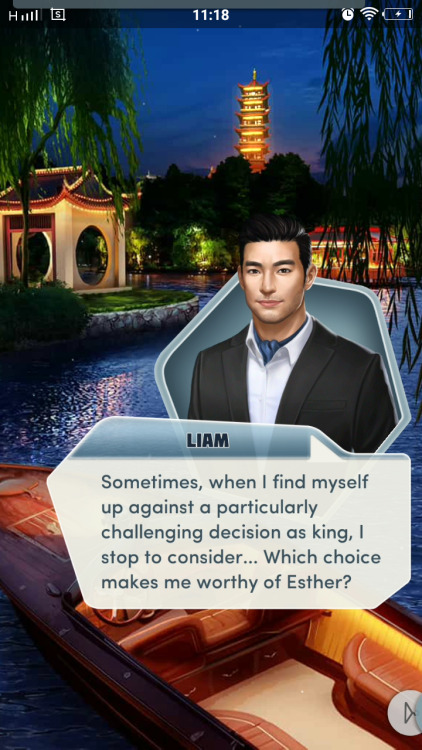
(Screenshot for Applewood Hedge Maze scene from Abhirio’s YouTube channel)
Liam speaks of what he feels about being King at the beginning of the scene, but it is only after the MC responds to the legend he narrates to her that we see what Liam thinks of how the MC will fare as a queen. When was the last time Liam had done this? At the Applewood Hedge Maze.
There are, however, a lot of differences between that scene and the West Lake one. In Applewood, Liam is certain of his choice and confident that the MC will be a good queen for Cordonia, but he doesn’t have a clear idea why yet. So he asks her what she would imagine her moniker to be, and what causes she plans to champion. This is his way of getting to know her better, and seeing what she, as queen, will be passionate about. As Regina said at the opera, Liam obviously sees something in her that everyone else didn’t.
By their tryst in Shanghai, Liam has a better, clearer idea of her as a woman and a person, a more nuanced experience of their dynamic and how they work together (if he is her LI). He speaks of her as being an integral factor in his decision making process (which choice would make me worthy of the MC?) and an inspiration for him to do the right thing (I look to you for strength. I look to you for the courage to choose the right path, even if it is the most difficult one). Liam’s trust in the MC was pretty strong already, but the events of Book 2 solidify that trust and confirm his belief that she is the best queen for Cordonia.
The main difference between the Applewood Hedge Maze and West Lake lies in how Liam sees her. Applewood shows us the hope that the MC will be the queen Cordonia needs. Hangzhou West Lake shows us the certainty.
Conclusion
This scene deals briefly with Liam’s thoughts on being King (as a counterpoint to what he says at the Eiffel Tower), but more importantly, it deals with how Liam views the MC’s journey, her struggles, her determination to stick it out and fight no matter what. To him (if she is his LI) she is the koi that became a dragon, the fish that fought its way to the top of the waterfall, the most fitting queen for Cordonia. This scene shows us the MC, through Liam’s eyes.
Sources:
"Leaping Over the Dragon's Gate - The Realms of the Dragons", by Michael P. Garofalo on the Green Way Research Website.
"2000 years of Examinations in China" from the China Sage website.
#the royal romance#liam x mc#trr liam#king liam the sexy#liam: diamond scenes#hangzhou west lake#shanghai#the legend of the lady white snake#the legend of the dragon's gate#dragon koi#chinese culture#li yu tiao long men
60 notes
·
View notes
Text
The worst part of “Both Sides Now” was that it really had potential
I said back towards the start of season three that it looked like Supergirl had turned a corner. Still not a good show, but at least it stepped its level up to “basically competent” in a lot of areas. It dealt with some lingering plot-threads of season two, introduced new stories that were clearly being seeded for later in season three, and had a level of production quality that put the first two seasons to shame in areas of editing, camerawork, lighting, blocking, and direction.
It has, of course, squandered all of that over the past half-dozen episodes, and that’s the tragedy.
“Both Sides Now” started very strong in the first ten seconds: The simple CGI of having Supergirl fly in was a nice touch of establishing that she has powers, along with the massive DEO support being deployed. It gives the impression that they’re taking this seriously and trying to cover their bases, even though we of course know the grunts aren’t going to actually have any impact on how things play out.
It starts to go wrong when Mon-El jumps into frame.
And this isn’t Mon-El bashing (Not only Mon-El bashing anyway), I’m serious: His presence is a major misstep for the episode in oh-so-many ways.
1) Why is he jumping into frame? It has been established that Daxamites cannot fly, they can only leap great distances, so are they trying to say that he literally hopped here from DEO headquarters? Why not just ride in one of the cars? Kara has several additional senses that would be helpful to deploy before arrival at the location, but he doesn’t have any of those other abilities that would be useful before getting to the destination. Mon-El jumping along the way is...just weird.
2) Why is Mon-El here at all? Again, not Mon-El bashing, but he isn’t a member of the DEO, nor does he have the same working relationship with the organization that he did in season two to just automatically get him assigned to missions. Yes, Mon-El has superpowers, but so do Imra and Brainiac, and they aren’t here despite being critical to defeating Reign in combat the first time. As of yet the DEO has no idea what kind of powers this new Worldkiller might have, so if they decided to branch out and draft other supers, why not all the ones at their fingertips?
3) Though not introduced until later in the episode, apparently at this time Mon-El is in the middle of a spat with his wife that boils down him being a douche (Surprise). Running off to fight a supervillain without even telling her about it is exactly part and parcel of that. Trying to present Mon-El as having grown and become a new person since his doucheiness of the second season falls even flatter by having him ditch his wife to hang out with his ex-girlfriend in the first scene of the episode.
We are only ten goddamn seconds into the episode.
Anyway, let’s continue, because again this post isn’t just about Mon-El bashing.
We seem to recover our footing when they storm the house and find Julia Freeman just casually listening to music, completely unaware of what’s going on. She freaks out when she sees a squad of soldiers aiming weapons at her, but Kara recognizes that she isn’t a Worldkiller and begins to reassure and calm her down, trying for an emotional connection.
This starts as a good scene. Emotional and tense, and sure we (The audience) know that Julia really is a Worldkiller and Kara is pretty sure, but with the genuine fear in her eyes Kara begins to have doubts. And then Alex -- ALEX of all people -- ruins it with violently flaring panic and aggression that spurs Julia to activate the Purity persona.
I recognize that Alex is very tense and scared to be confronting a potential Worldkiller: There’s the immediate personal fear of facing a being which has powers beyond your control, and the much deeper biting fear of Kara facing somebody with powers beyond her control. After seeing Supergirl beaten bloody by Reign, she’s going to be on heightened tension at the possibility of that happening again. It makes sense that Alex be riding high on adrenaline and wire-thin control. So why is she here?
J’onn is a telepath. He should know how close she is to losing control, how close she is to snapping and doing something violent, and since she is carrying lethal weaponry that snap could have permanent repercussions. It is standard operating procedure for police and military personnel to remove members who have an emotional connection to the situation for exactly these reasons. Why is J’onn, who’s supposed to be a competent and all-together supervisor, even letting her monitor the situation, let alone be there with a gun in her hand? Why does he not reprimand her at all when her brazen hostility triggers the fight they were trying to avoid?
...we’re still in the first scene and I’ve written seven flipping paragraphs already.
Moving on, we get Lena and Sam at her office. Zero complaints here, those two together were great. This bit of dialogue not only allows us to empathize with both characters while still tying in to the main plot (Since we know that Sam is Reign and the “blackouts” which have them concerned are when Reign comes out), but it actually fills in some backstory that has bothered me since Sam was first introduced as running L-Corp in Lena’s absence. They finally establish how Sam got such a powerful and high-paying job when dialogue between her and Ruby implied that she had been a struggling worker beforehand. And this is part of what I mean when I say this episode had potential: Here we see characters we already know dealing with the unknown dual identity of being a Worldkiller, which lines up directly with Julia and Purity as the main plot of the episode. If only the writers knew what they were doing.
After this we get Mon-El’s whining punkfest as he works on his car and complains about how hard it is to have a beautiful, kind, caring wife who loves him. This part here is just revolting: I honest-to-god hate his character. I can’t recall the last time I have despised seeing somebody on-screen as much as I despise seeing him. Especially in the self-pitying, blame transferring, petulant shitshow that he offers here.
Moving on again, there’s the interrogation of Purity, and for this you can just scroll up and read my complaints of Alex’s outburst at the house all over again. She shouldn’t be in the room or even watching on a monitor, she is just messing up an effective interrogation tactic because she can’t get a handle on her emotions. And yes, I freaking love Maggie too, and it sucks what you’re going through, and I’m not saying that I would handle it better than she would, what I’m saying is that everybody else should get her a cup of cocoa, sit her down somewhere, and keep her away from the supervillain so that they can stop from killing the world. Not to be callous, but effectively countering the Worldkillers counts for more than letting Alex work through her issues by shouting at somebody.
After this we’re at....I can’t even remember where we are anymore, so let’s jump to Sam and Ruby together. Like with Lena, this is gold. It is adorable and fun and sweet, it gives us a reason to care what happens to Sam because we see that she is loving and caring and a great mom to Ruby, who is also amazing. Sam doesn’t tell us that she Really Loves Her Daughter, we actually get to see it, and none of it is twistedly manipulative or abusive in any way. When Sam disappears because Reign has activated, it’s a great scene, contrasting the Big Scale Danger of a supervillain awakening with the much more personal but very real fear of a little girl who just noticed that her mom has disappeared.
Ditto again the scene with Ruby and Lena, and ditto-ditto Lena and Sam again at the end of the episode. These scenes work, especially when Lena deduces that Sam is Reign and promises to help her. This is Lena recognizing now bad this is for Sam, not about how this affects her. It’s the difference between “I will help you because you need help” and “I will help you because somebody else wants me to”. That is also the fundamental difference between Lena and Mon-El.
Let’s skip over a lot of the “action” of the climax because most of it is just generically bad, and hop over to Alex and Kara having their heart-to-heart to clear the air at the end of the episode. Normally I’d be happy at finally letting these two talk and not having Mon-El involved (Seriously, why is he the counselor over the past set of episodes?), except that all of the scenes focusing on him earlier in the episode -- and especially his absolutely ridiculous pityfest -- meant that this is the only part of the episode where the two of them delve into why Alex was acting out and how it drastically affected their operations. These scenes should have been spread all throughout the episode, with Kara (And also J’onn) trying to sideline her from the activities and dragging out the realization of why she’s on the edge. By pushing it all into one single conversation at the end it means that she’s just acting irrationally without being countered throughout the entire episode.
This episode had real solid material to work with, and even with the trainwreck it became some of the buried worth shone through, but Mon-El’s overpowering story presence and the sheer incompetence of the writers mean that it winds up just being a mess.
3 notes
·
View notes
Text
What Prairie has to say about dehumanization?
Black and white morality is inconsistent with the show's proposal. Besides poor writing, something I know the show was not aiming for, there is clearly a lesson to be learned from the main character, The OA.
Once people who analyse Hap had been "accused" to use his words (There is no evil, nor good) as if they were excuses, not simple understanding of human nature. But how about Prairie's words “It’s not really a measure of mental health to be well-adjusted in a society that’s very sick”?
The scene in which she convinces Betty to help Steve after he crippled a kid shows The OA don’t judge books by their covers. She thinks people who frequently make mistakes are lost, not inherently evil. She responds with kindness and compassion to them because violence is not a specific person, but a decease: you don’t cure it by spreading more. Society as a whole is very apologetic to brutality and the well-adjusted portion of it often excludes the other portion as lost causes, which is a brutality on it’s own. The OA sees the nuance.
If you look at the characters with the same black and white prism Hap has been looking at, Steve is doomed. He hasn’t done a selfless thing yet to compensate the violence he has inflicted, except join the others to stop the slaughter in school. Which was motivated not only by saving others, but also himself, so can we really greet him so many points? For the guy that sells drugs, uses his dog to attack people, cripples a kid and does nothing not self-serving for an entire season? Am I being too simplistic and not presenting the character in all it's layers? My point exactly.
We shouldn’t give him cookies for a good action first bc it doesn’t erase a bad one. Second, because the matter here ins’t to number the actions that redeem against those that condemn him. The matter is seeing the human in him capable of both.
This is why the fandom is open to Steve. Not because he did helpful, sacrificing things. They like him because he shows vulnerabilities and explanations why he is that way. Hap does this too, but the label of "villain" and affecting characters personally loved by the fandom makes it hard for them to recognize there is a troubled person behind the monster.
Betty: "I'm here to teach the kids that want to learn, the kids that have a desire to better themselves."
Implying individuals we frequently perceive as evil are not trying, maybe in their own twisted way, to improve themselves and their situation.
Prairie: “If you want to do your job, expel the bully. Focus on the kid who sings like an angel even though he doesn't need you. If you want to be a teacher, teach Steve. He's the boy you can help become a man. He's the one you lost. He's your first reason."
The OA tells us that the heroes, the ones who already got everything worked out? They don't need our help. They don't need understanding of their flaws, if these even exist to begin with. If they lose track, they won't be too far to figure it out again. But the bad guy? He is a mistake to himself and he is our own. He is our mistake from the moment we see him as nothing more than an annoyance in the life of decent citizens. Showing empathy to them is the real challenge of trying to be good.
Society treats lack of compassion as a badge of honor. Sets up limits such as “If you do this or believe in that, I don’t have any empathy for you. You can just die” to make compassion a whole lot easier then it actually is. Compassion is not a pleasing act that makes you look all-forgiving and divine. It’s hard, some people won’t even get it and call you naive, but it’s necessary.
It’s not forgiving and it’s not forgetting. Compassion is to recognize even in your enemy a person that has a history, acts upon values and believes that they think as valid, and wants to love and be loved back. They are not harmful for the LOLs of it.
"He's lost and in order to find him, you'd have to teach yourself again, and you decided somewhere along the way that you were done learning. It's too painful to stay open. Well, I think we all face the same hopelessness, Mrs."
This fandom hates Hap senselessly, but the problem is not Hap. The problem is all of us, suffering from the same need to dehumanize everyone standing in our way or the way of people were attached to.
To finish: "I don't give a crap where the violence comes from and why. I don't want it in my school."
Need I say more? This is what most of the fandom do ("I don't want it in my fandom" LOL). They close the door to a character's complexity to defend their favorites bc the people who hurt them can only be The Worst. Notice how Betty describes Steve with only negativeness: "a disruptive, violent, and frankly, terrible student" Would she describe him again like that after getting to know him better?
My point here is not that Steve is bad or Hap is good. My point is that maybe there is no such a thing as good and bad people.
There is only people, the hope they will do better, and the tragedy when they don’t.
#The OA#Hunter Hap#Prairie Johnson#Steve Winchell#Following the discourse it wasn't the show's intention that you would boo Hap
48 notes
·
View notes
Note
If you read Selina's "19 things we learned from SDCC" article, Rosy, would you mind commenting a little on what you think about JR's comments on how the story will wrap up? Thank you!
Here is selina’s article.
I didn’t read anything about Jason saying how the story will wrap up, so the closest quote I can assume you are talking about is this:
Rothenberg confirmed what he’s implied before, that this season is about “regeneration and rebirth.”
The full-circle-ness of the Eligius crew being the new Ark survivors, Clarke being the new Grounder and Wonkru being the new Mountain Men is obviously a big part of that, but the ‘rebirth’ and ‘regeneration’ is about a lot more than just the story being reset: we might also see the Earth begin to regenerate, allowing more hope for humanity’s survival moving forward. Hopefully.
But as for a happy ending? That’s still a firm “no” from Rothenberg, who confirms once again that this story, like all of his favorite stories, is a tragedy. So just, you know, keep that in mind. [X]
The story is a tragedy. It has always been a tragedy. When we start thinking it’s not and we’re going to get happily ever after stories with CL or Linctavia or Maya or Jasper or whoever else we think is going to be able to win through their tragic story and come out on top, and our favorites will live and ride off into the radiation sunset, we’re going to be disappointed.
So I would take JR’s comments to be an affirmation that we’re going to see more death and tragedy in the new season. More suffering. Yes. The reset button does not take away the essential nature of the show or humanity as realized by the show.
Audience beware. It’s still an “anyone can die” kind of show and we’re still looking at suffering and gray morality.
We should go to fan fiction for our fluff.
But I also thought it was important to look at the other, essential ideas that JR put forth. One. That this story has always been about Clarke and Bellamy and remains about Clarke and Bellamy. Go back and watch it again and see how that view point changes the way things we take in the show. Everything that happens is about how it affects our main characters. And when we thought the hero was someone else, it really wasn’t. So it WAS about Clarke and Bellamy still. Not as love interest and villain, but as heroes, STILL.
It was also said that it was about Clarke, Bellamy AND Octavia. This is important. We have to pay attention to Octavia’s role, whether we like her or not. It’s still unclear what side she’s going to be on. At least to me. Or how the conflicts being set up will shake out.
It was also said that this season is about regeneration and rebirth. Now to me, this offers some hope that is at the root of the theme. Starting over. The future. New chances and opportunities. We should look at all the major stories through this lens and see HOW the theme affects them. Clarke as a new protective mother? Bellamy as a new balanced peacemaker? Octavia as a new harsh leader? IDK, those are all things that have been mentioned, but let’s see what kind of “new changes” the reborn main characters will have.
Also an essential element I saw was a reiteration of the gray morality and that those we think are the bad guys won’t all be so black hearted. And the conflict between family will resurface as Bellamy and Octavia will clash? The gray morality contrasts with Clarke’s fairy tale of monsters and heroes. So placing that unreliable narrative at the beginning of this season is interesting.
All in all very interesting. (Little shout out to new love interest on the Eligius and I don’t know about y’all, but I’m hoping it’s someone worthy of Raven. IDC if you have her in another ship, I’ve got no one I like for her right now.)
Also a little shout out. What we learned about the show and season made me very happy because a lot of it really confirmed what many of us have been writing about in regards to themes, concepts, allusions, science fiction, characters, and WHO EXACTLY THE SHOW WAS ABOUT. So this little shout out is to the Bellarke meta writers. We stuck to the text and this is what it said and that is now confirmed by JR himself. Thanks JR. :)
#the 100#the 100 s5#the 100 speculation#the jr whisperer#it is still a post apocalyptic survival show
18 notes
·
View notes
Text
Title Darksiders III Developer Gunfire Games Publisher THQ Nordic Release Date November 27th, 2018 Genre Action Platform PC, PS4, XBox One Age Rating M for Mature Official Website
The return of the Darksiders franchise could be considered a victory all on its own. Originally owned by THQ and developed by Vigil Games, the Darksiders franchise saw both a strong effort and favorable reception in its titular first game. With the makings of a successful series on their hands, Darksiders II was released with similar favor, yet fewer than expected sales. THQ would then go on to declare bankruptcy, dissolving Vigil Games and breaking many a hope for the continuation of the Darksiders series. Fans of the franchise, myself included, could only think of the shame this was as we struggled with our disappointment and loss. Fast forward several years and we see the acquisition of the Darksiders trademark by Nordic Games, now THQ Nordic, the passing of the series onto developers Gunfire Games, and, finally, six years later, a brand new installment in our treasured series. In Darksiders III, we see the return of legendary heroes, a vast story full of deceit and tragedy, and unfortunately, many imperfections and shortcomings that plague what could have been an exceptional experience.
No kidding…
Darksiders III, similar to Darksiders II, takes place many years after the beginning of the Apocalypse, but decades before the Darksiders I storyline. War, answering the call of the Four Horsemen, stands accused of prematurely triggering this Apocalypse, which serves as a final showdown between angel and demon, heaven versus hell. With the near complete annihilation of humanity in the process, he now awaits judgment by the Charred Council, a group of powerful beings whose purpose is to maintain balance in creation. Fury, our heroine for this game, returns to the Charred Council and is tasked with the recapture of the Seven Deadly Sins, individuals with immense power who seek to establish their own rule in the now dilapidated creation. With their very existence a threat to the balance, Fury sets off to hunt them down, unraveling a story full of lies and treachery, but with glimmers of self-growth and hope.
Similar to Darksiders I, Darksiders III possesses a straightforward story with a few twists and turns along the way. The overarching mission, the hunting and defeat of the Seven Deadly, takes us across the scoured earth where we will meet many new faces and a few familiar ones on all sides of this timeless, apocalyptic war. Throughout her journey, the narrative begins revealing several of the secrets of the previous games, as well as their present influences. If you played the first game, you will already know what happens in the future, so seeing how certain acts and events affect this moment in the story is intriguing. And of course, being a prequel, many new facets are added to bulk up the overall series plot. This is actually handled fairly well, as the story for this chapter was entertaining enough to keep me engaged until the end. One added element that stands out is humanity, in that there are living humans in this game. After playing the first two games, I thought humanity ended and awaited some form of rebirth or recreation, but, apparently, there are survivors. However, they are ultimately just a device to build Fury’s character. Humans and humanity, despite being built up as a major element to the entire series, are in actuality just terms thrown around and NPCs that don’t do much. They didn’t get the depth to make that implied importance resonate. The rest of the plot plays out somewhat predictably and can get a bit dry at times, but, again, there’s enough mystery and curiosity, as well as a truly surprising twist or two, to keep me going.
What surprises me the most narratively in Darksiders III is its character development. Although subtle and exclusive to Fury, it’s something we didn’t see in the first two games. War and Death are two concrete personalities with little to no growth throughout their campaigns. Fury, however, sees an appreciable evolution. As she discovers more about the events and people around her, she discovers herself too. I think it’s my favorite element of the entire game, in that it’s a new addition to the series and it connects me to Fury in a way I never did with War or Death. Fury, starting off as an arrogant, self-centered fighter who craves battle and couldn’t be bothered with anything not relating to herself, slowly transforms into a strong, dependable character who finds a genuine purpose for her existence and, along with it, a new strength born of compassion. Even if her growth and character depth are lacking compared to other characters from other franchises, it’s noticeable in this series, as it’s something new and unexpected.
Unfortunately, that’s all we get. Other characters, whether they are new or returning, don’t see any valid depth or growth. While they all may be relevant to this story and it’s nice to see what returning characters are up to before the time skip to the first game, none receive any real development. They are introduced and we just have to take them for what they are. For example, the Lord of the Hollows serves as a guide and mentor to Fury, yet his character is incredibly vague. We know he’s knowledgeable, powerful, and disillusioned towards the Charred Council, but that’s it. He seems really important, but we never get that depth or impact to establish him as a series-changing character he was perhaps meant to be. Ulthane, a returning character, is the same sarcastic, good-humored Maker from the first game. And again, I appreciate seeing him in this game with a new role during this time, but again, other than his current purpose, we don’t learn anything new about him, nor does he show any different sides to himself beyond his care for humanity. It’s not even legitimately hinted that he acts out of remorse after what’s revealed in the first game. Finally, there is the Watcher, who aids in Fury’s development as someone Fury can speak and self-reflect with. However, as she serves as a way for Fury to verbally demonstrate her growth, the Watcher herself hardly changes from what she’s meant to be plot-wise. Overall, there was a ton of potential for more character growth by multiple characters, but only Fury receives any memorable development.
Moving onto gameplay, Darksiders III plays similarly to the previous games, in that combat is the focal point. Whether it’s clearing small mobs, taking down multiple strong enemies, or an epic one-on-one fight, combat is a familiar experience. In similar Darksiders fashion, there is a basic combo system in place, in which Fury can pull off various moves. What I especially like is that as the game progresses, Fury will obtain Hollows, allowing her different elemental affinities and new weapons. The variance in weaponry is something I liked in Darksiders II, so seeing a version of that here is appreciated.
Several other mechanics influence gameplay, ranging from platforming, to puzzle solving, to a leveling system. Platforming in this game is a bit dull, as Fury herself isn’t the most mobile or acrobatic character. As you gain Hollows, you’ll be able to propel higher, float, and carve out new paths. Really though, this all adds up to your typical item barrier mechanic that the Zelda or Metroid series are known for. Puzzle solving is also a fairly straightforward endeavor; the only real challenge being the sheer size of some of the rooms that need to be explored beforehand. With huge rooms full of multiple doors and corridors, getting turned around and lost can be an issue. The puzzles themselves aren’t all that difficult or creative and once the right path is found or the right item used, it becomes a routine chore. Finally, related to combat, is a leveling system. As you acquire blue lurchers, the currency for the game, you can give them to Vulgrim to gain attribute points. These points can increase your HP, power, or arcane power, which is the attack power specific to counter and wrath attacks.
The issues I have with gameplay are more than I would have liked, especially after a six year hiatus and the successes of the previous games. In addition to my complaints above, I am upset that this game is painfully linear. There is generally a main path to take with hardly any exploration. Even though some areas are massive rooms with plenty to hide, the general formula of big areas connected by hallways and single paths doesn’t change much. Exploration, which is really just item hunting, happens within these huge spaces. However, open spaces do not equal open world, and in the case of Darksiders III, this is terribly evident. This is an exercise in going from points A to B.
Combat, the major aspect of the game, is also flawed. The basic combo system is just that, basic. Ultimately, many players may end up settling for mashing the attack button. Nothing’s lost from mashing, as the combos themselves aren’t very inspired. Also, combat is almost always a close-quarters affair. Despite using a whip, Fury’s reach and combos are meant for up-close combat. It’s here where we should have seen combos and range play off one another. The only times I really enjoyed combat was against the Seven Deadly. Those battles felt as dangerous and epic as they are meant to be and the only time I was genuinely satisfied. I looked forward to those few battles because outside of those, combat is an uninspired, repetitive process, barely saved by the few great battles and variance in weaponry.
Another issue I have is the difficulty scaling. Although this is not the level scaling seen in The Elder Scrolls games, the increase in enemy attributes and difficulty are irritatingly implemented. Naturally, enemies will become tougher as you progress through each area and to stay capable of surviving, you need to raise your attributes. My issue here is that the extent in which enemy difficulty is raised belittles your efforts of leveling, as well as improving your arms and armor. Unless you flat out grind, it will feel like the same amount of, or sometimes even more, work is needed to defeat enemies and clear areas, despite all of your supposed progress. I wish improvements to attributes, arms, and armor all had more impact and substance to them. Instead, it feels like you’re not making any significant progress in growth and development. It still takes effort to kill minor enemies and they can still kill you in the same, average 5-10 hits, even fewer for stronger and boss enemies. It degrades the attribute system and any means of improvement. I felt Darksiders I did it right; even though later mobs were tough, War could take plenty of hits and still dish out heavy damage. Fury’s potential and improvements are just as soon cancelled out, so it leaves me feeling dissatisfied. If you don’t level up or improve your gear, however, you will suffer from it, so it’s a necessity, yet it still fails to add senses of achievement or growth. It’s not broken in any sense, but it definitely feels cheap rather than feeling like proper challenge.
The last few issues I have with gameplay are in regards to build and implementation. During my play, I noticed several framerate drops. For me, this occurred while I was in more open areas with many textures rendered and several enemy mobs attacking. In my playthrough, this happened equally during the beginning and latter half of the game and even though it wasn’t often, it was enough for me to comment on it. My biggest gripe, though, is the camera. The camera will do you zero favors in this game. If you’re near a wall or in corner, the camera loves to zoom in, preventing you from seeing anything else but Fury’s torso. The camera also doesn’t let you manually zoom out and this is especially annoying when surrounded by enemies. The majority of times you take minor damage, it will be due to enemies behind you and the camera. There is a lock-on system in combat, but other enemies will continue attacking, breaking combos or getting several cheap hits on you before you can ever swing your whip in retaliation. Now I’m not against having multiple enemies attacking, as this in of itself can provide more challenge. Yet, I think I prefer the combat style of Darksiders I, as when you’re locked-on an enemy, the others tend to hold back more. However, that style matched that game’s preference of fewer, but more engaging fights, versus here where there are just a few too many minor hordes that require a bit too much effort to clear. It’s tough to enjoy a good battle if you’re constantly looking over your shoulder and wrestling the camera to make sure you can fight properly. Simply put, the implementation needed to be stronger. Overall, the few gameplay strengths are cancelled out by its flaws, providing a study in pure mediocrity.
At least the characters and the lighting, too, are impressive
Mediocrity seems to be the magic word, as they reflect my feelings for Darksiders III’s aesthetics too. Visually, Darksiders III is exactly how you would imagine it. Backgrounds and environmental aesthetics are what you would expect from an apocalyptic dystopia. We’ve seen this for three games now and yes, the visuals are form fitting, yet they fail to offer anything new, unique, or outstanding. The graphics quality is fairly strong, so it feels like a wasted chance to utilize strong graphics to build up a more appealing effort. Having said that, I am very impressed with all of the character models. Fury looks awesome. She’s perfectly depicted as the capable, violent badass we come to know. I love her base design and I appreciate her appearance changes via the Hollows. Even the subtle details, like the accents on her armor, the color and lighting changes via the Hollows, or the acquired items that hang from her waist, I am thoroughly impressed with Fury’s looks. I am equally impressed with the bigger enemies, especially the Seven Deadly. From huge and grotesque to sleek and regal, the designs of the bosses are fantastic. They easily fit the sins they represent and just by their looks I was pumped to fight them. I wish that level of effort for character designs and intricate details was the same for the world designs, as it would have propelled this game’s overall visuals immensely.
Audibly, again, there are pros and cons. The voice acting is solid, as Cissy Jones gives dimension to Fury that matches well with her development arc. Jones does an excellent job of bring to life Fury’s multiple sides and vast array of feelings that War and Death lacked. But beyond Fury, it’s all lackluster. The Seven Deadly typically give cliché lines that don’t add anything to the mood. The NPCs suffer the curse of recycled, overused, generic lines that are as bothersome as an arrow to the knee. The voice actors themselves are great, but could and should have been better utilized. Musically, there is not a single memorable song in its soundtrack. Overuse of “artistic” silence and tunes that fail to catch your attention, the soundtrack might as well not have been implemented in the first place. That’s all I can really say about it; it’s that uninspiring. Strong pros muddled by too many cons make Darksiders III’s aesthetic appeal sorely average.
So yes, we got another Darksiders and perhaps that in itself is a victory. I only wish the experience was stronger in its entirety instead of feeling like a first effort. The first Darksiders, a true first effort, was a stronger production overall, which only makes this game’s flaws more evident. There is still plenty of enjoyment to be had and long-term fans will most definitely find and appreciate it. Truly though, I had high expectations for Darksiders III and can only hope this is just a one-time exception in what will hopefully be a longer-lasting series.
This slideshow requires JavaScript.
[easyreview cat1title=”Overall” cat1detail=”” cat1rating=”3″]
Review Copy Purchased by Author
REVIEW: Darksiders III Title Darksiders III
0 notes